#how this fits into the arthurian tradition as a whole
Text
I had this idea for a Percy Jackson-inspired story years ago, which was basically going to be about kids who fit into the Arthurian Legend in the modern world, with some other fairytale/folklore thrown in for the fun of it. The big premise of the story was a bunch of families who are "descendants of royalty" have all been required to produce an heir who can inherit the role of super-magical king/queen, but the whole thing is also going to basically be a contest to the death between the kids, and even when one of the "wins", they get bound to obey the "rules" of having this power (which is basically an insidious way to control them by the weird cult of people who are obsessed with returning the world to the "old ways" and following "tradition". yeah, that's as bad as it sounds). The kids don't specifically HAVE to kill each other in battles, but eventually all the "losers" will be executed once the winner is declared (so the kids are very desperate to keep winning).
The main group of characters slowly discover the truth and how much this sucks, but they aren't sure how to fix it; if they refuse to participate, other kids are still involved, and not all of them believe the truth about what will happen to the "winner". They have to come up with some kind of loop-hole that will end the entire contest, and stop the whole "royal heir" thing without totally ending bloodlines by killing more of the kids. I first started thinking this up when I was like, 19. I was pretty stuck for an answer myself, but I always go back to thinking of this from time to time...
I finally realized a good answer; the kid who is the focus, named Peter St.Drake, is a "seventh son of a seventh son". ALL the kids are, some seventh daughters of seventh daughters. This is the way it has to be for the rules to work. Peter is willing to take on the burden of "winning" without killing any of the other kids, but how to get out of being controlled in the end? The rules for this whole thing are very specific... but also out-dated. As Peter goes through so many adventures and grows up, some personal stuff is figured out. Eventually, Peter does become the winner. None of the other kids can qualify, as they are now "losers". Peter doesn't qualify anymore, either; she comes out as the ONLY DAUGHTER of a seventh son. No ruler is declared, the entire magical tradition is broken, all the families are free (and yeah; some of the people had been pressured to stay together so they could produce an heir. time for some happy divorce). Everybody is saved and the evil manipulators are defeated because the main character realized she's trans~
7 notes
·
View notes
Text
ok the tolkien arthuriana post bc i kept saying i’d make it
background/overview
huh so he was actually a lot less inspired by arthurian legend than i initially thought and kind of denied its influence;
his main problem with arthurian legend was that it was not actually british: “Of course there was and is all the Arthurian world, but powerful as it is, it is imperfectly naturalized, associated with the soil of Britain but not with English; and does not replace what I felt to be missing. For one thing its 'faerie' is too lavish, and fantastical, incoherent and repetitive. For another and more important thing: it is involved in, and explicitly contains the Christian religion.” [letter 131]
he mostly wanted something that was uniquely british, mythological and actual concise storytelling but considering arthurian legend is a bit of a hodge-podge and was spread all across europe (and even further) it was decidedly not that (honestly “fantastical, incoherent and repetitive” is a very fitting description for arthurian legend as a whole--)
he also found the characters like arthur to be too idealised and over-powered
but still you can draw a lot of parallels and have fun there: there’s gandalf as merlin, galadriel as the lady of the lake, aragorn as arthur, etc.
but generally, having interacted and influenced by medieval and european literature, interaction with arthurian legend would have been inevitable whether or not he particularly liked it
sources?/further reading? (a lot on parallels if you’re interested in that): wikipedia on tolkien’s influences, arthurian influence on lord of the rings by daniel nozick, the letters of j.r.r tolkien, interrupted music, the making of tolkien’s mythology by verlyn flieger, aragorn and the arthurian myth by pascual mondéjar, gandalf and merlin: j.r.r. tolkien’s adoption and transformation of a literary tradition by frank p. riga, galadriel and morgan le fey: tolkien's redemption of the lady of the lacuna by susan carter,
and with that done, onto:
works!
sir gawain and the green knight
sir gawain and the green knight (1925) scholarly edition (i.e. middle english) edited by tolkien & e.v. gordon
(this is also what they had to say about the gawain poet:)
He was a man of serious and devout mind, though not without humour; he had an interest in theology, and some knowledge of it, though an amateur knowledge perhaps, rather than a professional; he had Latin and French and was well enough read in French books, both romantic and instructive; but his home was in the West Midlands of England; so much his language shows, and his metre, and his scenery...
sir gawain and the green knight - translation
sir gawain and the green knight, pearl & sir orfeo - edited by christopher tolkien
original work
the fall of arthur (written c.1930s; published 2013) - unfinished epic poem, edited by christopher tolkien
other??
a middle english reader (1922) - it’s tough to know where to really draw the line between arthurian legend & medieval literature because of how entwined they are but for intents and purposes enjoy this; it’s a glossary of medieval english :-)
the red book of westmarch (fictional hobbit manuscript) may be based on the red book of hergest (featuring the mabinogion -- for which alan lee also did some illustrations for!!)
and that’s more or less it. now enjoy some various quotes vaguely pertaining to arthuriana because i combed through his letters for this
But the feats of arms in (say) Arthurian Romance, or romances attached to that great centre of imagination, do not need to 'fit into a politically purposive pattern'. So it was in the earlier Arthurian traditions. Or at least this thread of primitive but powerful imagination was an important element in them. [183]
I actively disliked [C.S.L’s] Arthurian-Byzantine mythology; and still think that it spoiled the trilogy of C.S.L. (a very impressionable, too impressionable, man) in the last pan. [259]
But his own mythology (incipient and never fully realized) was quite different. It was at any rate broken to bits before it became coherent by contact with C. S. Williams and his 'Arthurian' stuff – which happened between Perelandra and That Hideous Strength. A pity, I think. But then I was and remain wholly unsympathetic to Williams' mind. [276]
You can (if you wish) shove in 'Arthur'* on some other date, when you are recovered fully. *=presumably a lecture on arthurian legend [48]
most of which are actually in the context of c.s. lewis who probably had a stronger connection to arthurian legend if this is anything to go by however i have never read anything by him so. erm. tolkien arthuriana post over. here’s the lord of the rings. ok bye thanks for reading
#i <3 making long useless lists#i was actually pretty surprised he wasnt more into arthurian legend but at the same time i get it#resources#compilations#arthuriana#j.r.r tolkien#tolkien#arthurian legend#this could have been way better formatted ahhh sorryy
63 notes
·
View notes
Note
How did you decide on names for each of the characters in Gilded Shadows?
All sorts of places, really. Most of the side characters have names I just found on name lists - and some, like Wynter, Mara, and Odette, were named by the Kickstarter backers who created them. A couple of characters like Caissa's family or Brenin, have names pulled from mythology and folklore. Some of the place names are historical names from England (like Albion and Cestrescir) while some are made up (Sirre and Dionne). Others are pulled from mythology (Nysa, Pythia).
When it comes to the main cast. . .
Ari - is named after three people I used to know because I just liked their names (I used to know two Aris, one of which was "Ariel" and I knew someone with the last name Vaughn in junior high. In the end, they're just names I liked).
Caissa - this name is from a fictional chess deity. And Fianchetto is a chess. . .strategy? Move? Not sure how you'd phrase it. Both his father and brother (Keres and Deimos) are named after Greek underworld deities.
Caleb - Caleb is just a name I like in general and Zheng is a name I settled on after some research.
Jack - Again, Jack is just a name I happen to like that I felt suited this character. Viscer is made up? Or at the very least it didn't come from anything specifc. It just sounded cool.
Lance - I don't really know how I settled on this name. It's just a nice name. And his last name. . .ANYWAY. *runs away*
Magnus - he's named after a famous chess player. Ulrich, I don't remember. I know it was a name that came through research and I just liked that it has kind of a deep, harsh sound to it.
Quill - I don't remember how I settled on Quill for him but androids in GS have unique naming conventions in that they tend to not use traditional names so much as just picking words they like. A lot of the biosynths have "odd" names - Quill, Lock, Poet, Finch. . . I have a whole list of words I think make good names.
Reuben - Reuben is another one that is just "A name I like" and Kelner is another name I found through research and going through name lists.
Yuu - Same as above.
Morgan - Ugh. Leone was a name I settled on right away because I like how it looks and sounds. But Morgan. . .ugh. Morgan had so many first names. None of them quite worked or seemed to fit. I think Morgan is the 5th name? I finally settled on it because it has some relations to Arthurian legend - and there are a few other Arthurian references in the game.
So yeah. Naming stuff has no real pattern. I get names from basically everywhere.
36 notes
·
View notes
Text
The Green Knight: A Ramble Through the Field of Honor
So I talked in an earlier post very glancingly about the line “Why greatness? Is goodness not enough?” and how it fits into the idea that Gawain has no idea what true greatness looks like, and I think, dovetailing into that, we kind of have to talk about how Gawain is...not a great guy.
And I’m not even talking about the way we begin the movie with him in a brothel, though I am going to use that to spring off here and talk about his conduct toward Essel. Knightly stories are full of these ideas of chivalry particularly around women, and I think Lowery is using Essel to make the point that Gawain is not doing that, not even remotely. Essel is a working girl, sure, but she’s also, as its shown throughout the movie, devoted to him, and cares for him far beyond his ability to provide for her. She even tells him that she has his gold, when she asks to be his lady, but she wants very simple things--to sit by his side at the fire, and have his ear, and be his lady. In full fairness to Gawain, I suppose, he never pretends even for a moment that he has any intention of doing that. Gawain is not interested in whatever he might owe her, because in seeking his greatness he utterly passes by this goodness.
We see this again in “A Kindness” where he repeatedly tells the scavenger that he is “Just passing through” when asked if he is a knight, not dodging the question, exactly, but allowing the scavenger to think this untrue thing. The scavenger talks about how he has brothers out there, the wide field of bodies like the fallen trees, showing us the lumber that Camelot is built upon, but Gawain does not have a moment for sympathy or pause. He fails to see this kid as a human being, and the narrative allows us to glance over it too, fixated in the same way Gawain is on the destination and not the journey.
Even when he is given instructions about how to get to the Green Chapel, when it’s been shown he has only the roughest sketched ideas of the way--and we can argue that the instructions may be false, but I’m not sure I think it matters--all he offers this scavenger, this BOY, is his thanks, despite being told he’s lost his family, was almost lost himself. He has to be shamed into offering a single coin, when Excalibur itself was offered to him when he needed the help.
This goes back to the idea of a test, and of Gawain’s repeated failures to have honor, to be great. He can’t see that mercy and generosity are a part of what it means to be a knight, to bear that mantle of goodness that I would argue underlies the knightly ideal.
This is why, when he’s captured and his things taken from him, he asks for the GReen Chapel and is told, “You’re in it.” This is a test as surely as kneeling before the Knight himself, and he’s failed, not only the test of generosity, but of courage, as he pleads with them that he’s not a knight, and he never said he was, and it’s true, that he isn’t, and so he’s stripped of all the trappings that make him a knight--his horse, his arms, his shield--because if he will not behave a knight, if he will not meet the world with the courage and honor he’s meant to have, then he may as well have none of it at all.
Gawain is pretty much a world-class fuckboy until the Tale of St. Winifred, until he truly connects with the natural impulse within him in the form of the fox (More on this in a much longer later post)
The tale of St. Winifred is his chance to begin his redemption, really the first time that he’s been willing to take any real instruction on the nature of becoming a knight--he sure as shit could not be bothered to listen to Arthur--and so this is where he earns back the axe. He earns back the right to even have this quest in the first place.
I don’t know how much the audience knows about the tale of St. Winifred, but the details are changed from the usual telling of the story in order to support the themes of the film. St. Winifred is also, in one sense, a tale of beheading and of virtue. That in upholding her ‘purity,’ she lost her life and her head. This is why I think it’s not actually a foregone conclusion that Gawain is spared at the end--I think Lowery makes the point that sometimes our values must be paid for in blood.
The flexible nature of honor is addressed directly in Winifred’s story. From the beginning, when she tells him not to touch her, that “a knight should know better,” there’s a sort of restarting the clock on his ability to be that knight. He just failed the last test, but as people, we are not who we are in one moment, whether that is terribly virtuous, or terribly cowardly, but the accumulation of who we are in all the moments. Each story is the chance to start again, and that’s why you’ll see so much menton of his being a knight at the start of each ‘section.’ It’s his chance to begin this anew.
In that way of, just tell the audience what’s going on, when Winifred is telling her story, of a man who came and desired to lay with her, and says, ‘Perhaps he was thee,’ that’s not just speaking to the sense of circles and repetition of nature in the movie--though not unrelated--but the idea that Gawain could be that man, could still, in a sense, choose to be that man. That he can always fail this test, too.
“If I go and get it, what will be my reward?”
It takes you aback, just for a moment, when he asks her that, until we realize that we were all asking ourselves that too. Reading into the traditions behind knights and saints, I think we’re used to the idea that a boon will be received for dong the right thing, and Lowery asks us to evaluate all that in Winifred’s reply:
“Why would you ask me that? Why would you ever ask me that?”
Harkening back to when he didn’t give the kid more than just a single coin, and telling him, “my thanks”--does he really have the right to ask for such a thing when he couldn’t manage to reward kindness himself-- but also the idea that honorable tasks should be taken up for their own sake, and not in order to have a reward. Can you truly be said to be acting with chivalry and honor if you’re doing it for a reward, or even notoriety?
Going back to my larger theory that Lowery is trying to bring forth the idea in all of this that there is no such thing as being a “knightly” sort of person at rest, while still holding that the decisions of a moment can cement the sort of person we continue to be, it makes sense that he would ask if we can say Gawain passes this test, if Winifred regards him.
“Now I can see thee,” she says, because this is a baptism of sorts, and being a saint, she can only see a soul in clarity. This is the direct opposite to the moment that Arthur tells him he has mud on his face, this is in direct opposite to his behavior with Essel, this is him doing the right and kind thing for a woman, without a thought to reward, and in that, he is cleaned, and Winifred can see what’s underneath, the sort of man he can be under what he’s accumulated.
ANd this is why he gets back the axe. It gives him leave to continue his quest, even though just a bit earlier, when asked where he was going, he simply said, “home.” But the show of the axe let him know that honor was not yet lost to him, that there was still a chance to be the sort of person he might have been.
WHich, by the way, does not makes things clear to him still. Life is not that simple, and I am very very resolute on my idea that a lot of what this movie is about is about the journey of our own lives to meet death and live with honor inasmuch as we can overcome our own cowardice and shitty behavior to do so, and even at the end of it all, about to meet the Green Knight, asked why he’s doing it, expressing that honor is why a knight does what he does, and then, pressed, says:
“Honor is a part of the life I want.”
This is Lowery pretty firmly taking aim at the old Arthurian texts, wherein honor very often good be a sole raison d’etre, saying that for most of us--and I would argue the whole reason Gawain is a fuck up is that he’s meant to represent most of us--that isn’t enough. There needs to be something more.
I also don’t think, for all I’ve talked about tests, that Gawain’s cowardice with the Green Knight had to be the end of the story. I think Essel’s pregnancy, and his cruelty, was a test. I think lying about what happened in the Green Chapel and accepting a knighthood was a test. I think there are multiple tests in that little interlude, but you see, the problem is, the more you do something, the more you’ll do it. As he makes these choices, this more and more becomes the man he is, as these choices stack up like stones, it gets harder and harder to knock down that wall. This is why his green sash--his cowardice--has become a physical part of him by the end of that interlude, bleeding as he draws it out.
Honor isn’t set, and it isn’t enough. Life is a confusing journey, rife with difficulty to do the right thing with consistency not because of outside influence so much as ourselves. Gawain’s great antagonist in al of this is not the Green Knight, but himself. Such as it is for all of us, as we TRY to be good people, and risk sometimes redefining honor, or greatness, what it means to be “a knight” in order to convince ourselves that it might be true.
“Is this all there is?” Gawain asks, before the axe is laid down, and I want to give Dev Patel a lot of credit here, though I’ve mostly been focusing on imagery and story. I’m not sure this would work as well if he hadn’t made it feel quite as human as it does, when he says it. It’s the question I think all of us ask, as we contemplate our own deaths, our own struggles to even up with what was right. Is there no way of knowing what comes next?
Life is a series of tests. A measure of honor. And what else ought there be?
On Doc and The Green Knight
#Green Knight shit#hi please enjoy two thousand words where I'm still not sure I said all I wanted to
92 notes
·
View notes
Note
Predictions on Baby Girl Sussex?
I’m FREEEEEEEE from finals and ready to chat with you all once again! Thank you all for being so patient, I’m so excited to dive into all your questions and give them the novel-length responses they deserve 😉
I’m assuming you mean name predictions haha, cause the only other thing I can think of to predict would be her birthday (for the record, I’ll go ahead and put my sister’s birthday, June 10th, for no reason other than I predicted my own birthday, April 26th, for Archie!). But I love talking about baby names (as you can see by the length of this post 😅), so let’s get into it.
So I fully expect to be completely taken aback by their pick. Like not even on the same planet as my predictions. Cause that’s just how those two roll lmao. But IF they’re staying in the same theme as Archie’s name, I’m expecting something that’s also short, possibly nickname-y, kind of dusty and vintage, but with a whimsical charm, just like Archie’s. I am still operating with the assumption that she will one day be Princess (whether or not that actually happens, of course, remains to be seen), so I’m trying to keep that title in mind. And also, given that name meanings appear to hold significance to them, I tried to at least somewhat keep meanings in mind. So, in no particular order:
Eloise
“Healthy; wide”
French, English
I am SO charmed by this name. If I hadn’t already decided on Elliott for my future son’s name, this name would be right at the top of my future daughter’s list. I just thinks it’s so delightfully playful yet still timeless and classic. It gives easy and pretty nicknames with Ellie and Ella, or even Lizzy (possibly to honor her great-grandmother?). “Archie and Eloise” sounds so perfect and natural to me, without sounding kitschy or too over the top with the matching. “Princess Eloise” is so deliciously perfect, it just fits together like a puzzle piece.
Eleanor
Unknown meaning
English, French
Eleanor hits almost all the same beats I mentioned above for Eloise, even down to the lovely Ellie/Ella nicknames. It’s even more royal than Eloise, with such heady associations as the legendary Queen Eleanor of Aquitaine (not to mention the American Queen, First Lady Eleanor Roosevelt!). Eloise is closer to my heart, but I’d be thrilled with Eleanor as well.
Greta
“Pearl”; diminutive of Margaret
German
This one’s quite old-fashioned, but I think it’s so charming and would make an adorable name on a little girl. And fun fact, the name Meghan comes from a nickname for Margaret, which is why both those names as well as Greta all mean “Pearl.” So this would be a perfect way to honor little girl’s mama in a more subtle way.
Poppy
“Red flower”
Latin, English
Spunky yet sweet. Pays tribute to her mother’s homeland of California, while also sounding very at home in her father’s homeland of the UK. A flower name in honor of her mama’s own mama. This scarlet name would be even more perfect if the Ginger Avenger manages to make himself another little Gingette. And as I said to one of my anons the other day, “Princess Poppy” is so screeching cute I might actually combust if I think about it too much, so let’s move on.
Lea
“Meadow; weary”
English
To be totally honest, this one is mostly just because I’ve been addicted to listening to “Lea” by TOTO on repeat lately. Although “Princess Lea” might be a bit too . . . you know. Stor Wors. Even though the sci-fi princess pronounces her name differently, I think they’ll probably still want to avoid that association. Still, that song is heavenly and the name goes with all my criteria so I’m putting it in anyways.
Hazel
“Hazelnut tree”
English
Another nature name, one that I’m sure our favorite Earth Mama will enjoy ;) It’s newly popular, but in my opinion still retains that distinctive and whimsical uniqueness of a name that’s much further on the fringe than Hazel actually is. I can just picture a little hazel-eyed princess running barefoot around her gorgeous backyard, wild hair all spread out as she lays underneath a hazelnut tree. Ugh, so cute.
Etta
“Estate ruler”; feminine diminutive of Henry
English, Scottish
I suppose in response to Archie’s middle name Harrison, I’ve seen some Squaddies predict Henrietta for his little sister. And um . . . that is not a favorite of mine 😅 But if Harry wants to add his brand to his second little munchkin as well, why not Henrietta’s much more sleek and dynamic offshoot, Etta? It's got that old school feel, with also a spark of liveliness. I also love that it ties to their Black ancestry through one of the most legendary Queens of American Soul Music, Etta James.
Maeve
“She who intoxicates”
Irish
Incredibly endearing with a rich history. For my own personal use, this safer option might actually be called upon for my future daughter if I never manage to work up the courage to use my actual long-time Irish favorite, Saoirse. But for Harry and Meghan, I can’t really see them using this one. Still, I felt like I needed an M name to cover all my bases, and this is one of the few that I like. Some other honorable “M”entions (get it?) include Maisie, Melody, and Madeleine (thank you to my lovely anon for this one!).
Francesca
“From France; free man”; variation of Frances
Italian
I haven’t really mentioned middle names here, mostly because this post is long enough already and middle name combos just add a whole other level of crazy. But given the enormous legacy of her grandmother, I am extremely torn on whether Baby Girl will be getting a name in her honor. If her parents so choose, Diana’s middle name Frances, or even it’s more ornately feminine variation, Francesca, would be lovely honors for the little princess to carry. If they do end up honoring Diana, I’d expect it to be in Baby Girl’s middle name.
Violet
“Purple”
Latin, English
One last flower name for Earth Mama Meghan. Violet was my top pick for Archie when he was still the mysterious Baby Sussex, but though it has since fallen from my top spot, it still is a lovely, classic name of inarguable feminine grace, yet with an underlying core of strength and fortitude. I feel like Violet is a woman who ties her hair back with a soft velvet bow, but then hitches up her skirts, draws her sword, and shows the battlefield who’s boss. I just love the duality of this name, and I think it would be a lovely gift for a little girl.
Alice
“Noble”
German
Vintage, classic, girly, and solidly royal, this name calls to mind white rabbits and looking glasses. Once again, on a personal note, this might be an option for my future daughter if I chicken out on trying to get everyone to pronounce Alicia correctly. I love that name in the Spanish pronunciation, “Ah-lee-see-ah,” but I find the Anglicized “Ah-lee-sha” to be dreadful and I wouldn’t want to burden my girl with a lifetime of corrections. Anyways, Alice is just as elegant, if not quite as ornate, and in any case is much more likely for our British-American princess. Plus, what a stunning pair of name meanings to gift these two siblings: “Brave” Archie and “Noble” Alice. They sound straight out of an Arthurian legend. (Plus, how cute would “Archie and Alice” sound!)
Honorable Mentions Cause I Need To Wrap This Shit Up:
Evie/Edie (both follow all the E names I wrote about above, and Edie in particular is a modern name full of moxie that would be a great nickname for the older, traditional Edith)
Lily (yet another flower name, and I just like the sound of this one)
Spencer (another possible route to honoring Granny Diana, yet maintaining a much more modern and spunky taste than Frances, while also being less direct)
Clara (of Nutcracker fame, adding here mostly because I think I’d melt if I heard this in Harry’s voice and accent)
Lucy (same vibes as Alice and Clara)
Ivy (cute, simple, girly nature name, but unfortunately already in use by the daughter of Meghan’s close friend Jessica Mulroney)
Zoe (I have absolutely no personal connection to this name, but for some reason it just now randomly popped into my head as something they might choose, so here ya go)
So yeah! Sorry this was so long, but it was super fun! Thank you for sending in this great question. I’d love to hear all your guys’ name predictions, dream picks, and wild card guesses!
#meghan markle#prince harry#baby sussex 2.0#royal fandom#the princess of montecito#baby names#markle & spencer#the munchkins of montecito
19 notes
·
View notes
Text
Who is John Barleycorn?
Gruesome Origins & Modern Retellings
youtube
I was planning on making a post about the different harvest traditions for the Autumn Equinox, but in the middle of doing research for that I came across a character so crazy and fascinating that I felt the need to devote a whole post to him. So today let’s go down the rabbit hole together to explore the strange tale of John Barleycorn and what it might reveal about our Pagan history.
The Autumn Equinox, also known as Mabon, is the second of the three important harvest festivals. Most Pagan harvest festivals embrace the idea of sacrifice, perhaps none more so than Mabon, which is the time when the last sheaf of wheat & barley would be harvested. This notion of Sacrifice is one of the key themes associated with the popular story of John Barleycorn. You may have heard one of the many musical variations of this story or perhaps you're more familiar with the Robert Berns version from 1782. If you haven’t ever heard this English Folk Song, give it a listen
The story of John Barleycorn actually has really old origins. There is a Scottish poem with a very similar theme and wording included in the Bannatyne Manuscript of 1568, though it’s likely that John Barleycorn is even older. This is because the Bannatyne Manuscript is a collection of pre-existing works, many coming from the ancient oral tradition. And considering the many pagan themes in the story, it’s definitely possible that the origins lie in Pre-Christian times. Specifically there may even be a link between John Barleycorn and the mythical figure Beowa, which is a figure from Anglo-Saxon paganism whose name means "barley."
Now, the prevailing theory is that the tale of John Barleycorn is a symbolic representation of the crop of barley being harvested each autumn. The song describes the process of preparing the land, sowing the seeds, waiting for the crop to grow, and eventually harvesting. Then the song describes making the products of beer and bread which were key staples of the diet of early agrarian people. For the most part this all makes sense but those of you who have read the poem or listened to the song have probably noticed the really gruesome way that this harvest is worded. For example:
“They laid him out upon the floor,
To work him further woe;
And still, as signs of life appear’d,
They toss’d him to and fro.
They wasted o’er a scorching flame,
The marrow of his bones;
But a miller us’d him worse of all,
For he crush’d him between two stones.
And they hae taen his very heart’s blood,
And drank it round and round;
And still the more and more they drank,
Their joy did more abound.”
Sure, maybe that’s just meant to be a creative interpretation of how to turn barley into beer and perhaps the reason this story has survived so long is in part due to the violent imagery, which makes the story more interesting and memorable. Though perhaps there’s a bit more to the story.
I want to share a theory that I recently found that might have some merit. This theory proposes that the tale of John Barleycorn is more than just a metaphor for the barley harvest and that it in fact contains references to real human sacrifices that occurred in Ancient Britain. I know what you’re thinking - pagan human sacrifice is a big trope often used by others to slander paganism. But hear me out for a second because there’s some really interesting passages in this poem that deserve further inspection.
The poem begins with:
“There were three men come out of the west,
their fortunes for to try,
And these three men made a solemn vow,
John Barleycorn would die”
It’s interesting that we start with 3 men coming out of the West. We’re all familiar with the religious importance of the number three. The Celtic triad & triple spiral are of course famous symbols in Celtic paganism. I also think it’s interesting that these men are coming from the West because in Celtic myths coming from “The West” meant coming from the otherworld or realm of the Fae.
Also, in the tale of John Barleycorn before the the cutting of the barley there is an interesting passage that states:
“They let him stand till midsummer
Till he looked both pale and wan,
And little Sir John he growed a long beard
And so became a man.”
Of course the reference to midsummer is interesting from a pagan perspective but I’m even more interested in the “growing a long beard” part. Firstly, I’m not sure how the beard part fits in if this poem is just a metaphor for the barley harvest. Instead, I think it’s possible that it’s referencing the long beards of the druids. The druids believed that our life-force was channeled through the extremities which is why Druid priests would grow their beards and hair long. So perhaps our John Barleycorn is representing a sacrificial priest.
Next in the story we have a death being depicted in the poem, but it’s a three-fold death. The poem states:
“They hired men with the scythes so sharp
To cut him off at the knee,
They rolled him and tied him by the waist,
And served him most barbarously.
They hired men with the sharp pitchforks
Who pricked him to the heart.”
The three-fold death is a really common theme in Celtic and Anglo-Saxon folklore. Even Merlin in the Arthurian legends prophesied a three-fold death for himself which would occur by falling, stabbing, and then drowning.
So already we’ve found references in the passages of John Barleycorn to:
- The Celtic triad and the Faerie realm in the west
- The spiritual tradition of beard growing among the Druids
- The importance of the three-fold death in Celtic lore.
So what’s really going on here? In the famous anthropological book called “The Golden Bough” by Sir James Frazer, he states that the Barley King was personified in ancient ritual practice by a real person. This man was honored as a King during the yearly cycle and when it was harvest time he would be sacrificed and dismembered and his body was dragged through the fields to ensure a fertile harvest for next year.
This reminds me of a particularly gruesome passage in the poem:
“They've wheeled him around and around the field till they've come unto a barn
And here they've kept their solemn word concerning Barleycorn
They've hired men with the crab tree sticks to split his skin from bone.”
If this is just a metaphor for harvesting the barley, then what is the purpose of wheeling him “around and around” the field. Perhaps Sir James Frazer might be right and that this passage could be a reference to the sacrificed individual being dragged through the fields to ensure the fertile harvest.
It’s definitely a pretty disturbing visual and I probably should point out that we don’t really have much historical evidence concerning Pagan religious sacrifice. One of the most popular accounts of pagan human sacrifice comes from Julius Caesar during his conquest of Gaul where he reports to have seen the burning alive of victims in a large wooden effigy, which is now known as a wicker man. Though considering the Celts were his enemy at the time it is possible he exaggerated some details.
So, while it’s likely that some human sacrifice occurred among the Celts and Anglo-Saxons we don’t really know too many details and it’s likely that the violence was probably a bit exaggerated.
So when it comes to our story of John Barleycorn we have our two main theories:
The first theory is that the story of John Barleycorn is just a metaphor of the barley harvest and that any violent wording was just added for extra flair and it doesn’t represent any wider themes.
The second theory is that the story of John Barleycorn actually contains references to the practice of religious human sacrifice among the Celtic and the Anglo-Saxon pagans.
So which theory is correct? In my opinion I think it might be both. I think the main purpose of the story is to be a metaphor for the autumn barley harvest. Though because this story is in fact really old, I think it picked up some Pagan references, stereotypes, and motifs along the way.
But, I’d love to hear what you think the story of John Barleycorn represents. So share your thoughts down below in the comments.
#pagan#Autumn Equinox#traditional witchcraft#druid#english magic#english history#folklore#witches of the world#baby witch#wicca
111 notes
·
View notes
Text
Kamigawa was a failed endeavor. Released in the autumn of 2004, Champions of Kamigawa promised some new things for Magic the Gathering, and the return to some old things as well. Most importantly, in my opinion, it showed that Wizards was paying attention to what fans were interested in (outside of Magic) and wanted to provide a way of relating to the fans. However, just about everything they did with the setting and game either couldn’t live up to expectations or outright failed. Here’s why I think the original Kamigawa block failed, and why I think a return would be a resounding success.

This came out much longer than I’d expected, so hit the jump.
For its entire existence up until 2004, most of Magic’s settings were a hodgepodge of fantasy tropes, and the storyline had been following or tying into a single thread for years. Kamigawa was the first setting to truly be free of the ongoing Magic story. Nowadays, however, Magic is known for its settings based on real-world places and cultures. Just this past year, we’ve visited Eldraine (Arthurian Britain), Theros (ancient Greece), and Ikoria (less a real culture and more about giant monster tropes). Back in 2004, however, visiting a clearly defined theme world like this was something that hadn’t been done in a long time. In fact, it’s something the franchise traditionally shied away from. 1996’s Mirage block took place in Jamuura, a continent on Dominaria based on sub-Saharan Africa.1995’s Ice Age was set in a Viking-inspired Terisiare. (You could say that Arabian Nights and Portal Three Kingdoms also count, but those were more wholesale copies than homages.) Based on ancient Japan, Kamigawa was the first herald of a new worldbuilding philosophy for Magic, one that would see the creative team at Wizards of the Coast put their own spin on familiar cultures and mythologies, while still keeping them distinctly their own. Kind of like Disney movies.
The mechanics also promised to shake things up. While I don’t remember any of the card announcements, Kamigawa block introduced many new pieces for the game. Samurai and ninja had their own keyword abilities in bushido and ninjutsu, and most of the sorcery and instant cards dealt with arcane and spirits. Legendary had its own theme as well, with 138 unique creatures (139, if you count the other Yamazaki brother) and 39 other permanents, with a number of cards that cared about the supertype. Finally, there were flip cards, a mechanically and visually interesting way of getting more value out of those creatures and introducing a sort of sidequest to your game.
Kamigawa was gearing up to be something special in Magic. But as I said at the very beginning of this piece, it failed.
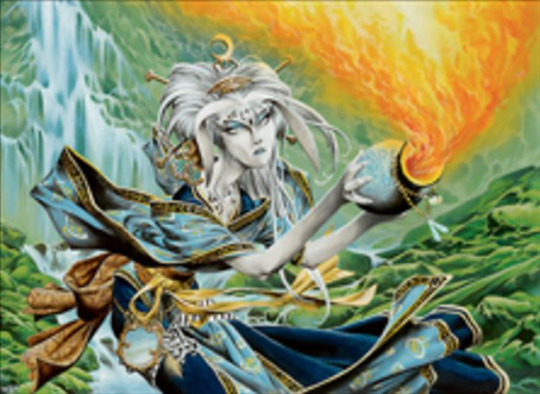
The mechanics were kind of a disaster. Splice onto arcane was parasitic and to get any value out of it, you’d need to go all-in on overcosted cards. Bushido, sweep, offering, and most of the rest of the keywords were similarly underwhelming, either providing minuscule value or actively getting in the way of what you wanted to do. Putting the legendary supertype on a card is a downside when Commander doesn’t exist and singleton formats are not a popular way of playing. It doesn’t help that having too many legendary creatures in a set thend to make them feel less special, as well. Flip cards, while cool in theory, wound up being a logistical mess that didn’t add much to the enjoyment of casual games, and barely saw tournament play. All of this meant the cards didn’t really impact Standard, and Limited was a clunky ordeal more often than anyone would have liked. Following Mirrodin block, the most powerful three sets since Urza’s block, was also a tall order, and one that almost no set was equipped to fulfill.
Admittedly, while I love the card game, I absolutely adore everything else about Magic. The storyline intrigued me when I started playing during Onslaught block, and knowing that there was this vast body of lore kept me hooked. Hearing that there was a Japanese-inspired setting coming up was pure hype for someone who’d also been into anime for years and video games for years before that. The early 00s were an interesting time for entertainment, as Japanese animation had finally infiltrated American mainstream media. Pokémon had been a successful card game for years (another story for another day), and Yu-Gi-Oh had just hit the scene in America after doing well in Japan for a few years. With all this and a burgeoning internet, fans of anime, video games, and Japanese culture had certain expectations. To say Kamigawa did not meet them would be an understatement.
The general setting was based on an older Japanese culture, one which didn’t see much representation in media. Samurai, ninja, youkai, along with other popular figures and tropes were either later inventions or had a more solidified image hundreds of years after the source material took place. While I remember many Magic the Gathering fans being worried that the game would take on an anime aesthetic to capitalize on what was popular with the wider geek audience, they actually took it in the opposite direction. Instead of bright colors and bold outlines, Kamigawa was a dark and gritty place, which was made even more evident by the increasing demand for realistic detail in the art department. The kami themselves, one half of the conflict, were alien and foreign to behold. These weren’t based on images that otaku would have been familiar with, Japanese or Western, but based on much older stories that had been phased out of the public consciousness.
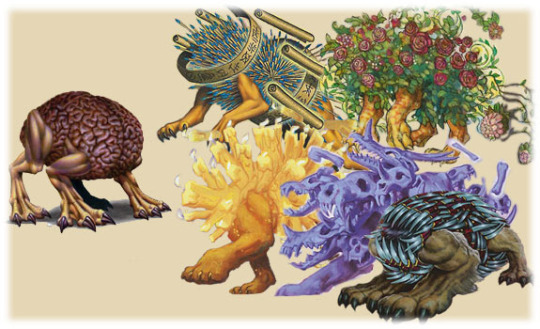
In short, there is no “in short.” There are many reasons why it didn’t succeed, but ultimately, it came down to being something that no one really expected or wanted. Instead of taking the cheap, easy, and profitable route by leaning into anime culture, Wizards bucked the trend and used a setting that most Magic fans would not have been familiar with, forcing it to fit within the franchise. They also filled the block with parasitic mechanics that were clunky and actively detrimental to play. And yes, I’m leaving out dozens of other reasons why Kamigawa failed, but those are the main ones that I personally feel hurt the setting.
Sadly, as public-facing employees remind us constantly, Kamigawa is a very difficult sell to the higher-ups. It was one of the company’s biggest failures, and they can’t use tweets and Tumblr asks from enfranchised fans as justifications for its return. And yet, the requests still pour in. I believe that the reasons for this desire are the key to a new set based in Kamigawa.
Let’s start with the biggest one: Commander. In many ways, this format is kind of the anti-MtG. It’s a long, drawn-out process that uses decks built with your whole collection, rather than the newest releases. Cards that are awful in most other formats are amazing in Commander, and one of the biggest drawbacks a card can have - the Legendary supertype - is a major boon here. It’s also the current most popular format for old and new players alike. I think that more than anything else, Kamigawa’s legendary theme is what draws new players, as Commander enthusiasts will inevitably find some interesting cards that would never have worked well in the old days.

I also think that Wizards of the Coast has learned a lot since 2004 (and whenever they started work on the original block). Remember, Kamigawa was the first of its kind: a real-world inspired setting completely separate from what the entire franchise had been doing for years. There were bound to be mistakes, and they’ve clearly learned how to rectify them. The following setting, Ravnica, used an Eastern European city aesthetic to compliment its two-color guild theme, but was still constrained by the block structure. Upon our return there, they changed the block structure to better fit what the themes and story wanted. On the other hand, Zendikar, their D&D-inspired adventure world, was beloved for its fast and fun mechanics, as well as the feeling of exploration on the cards and in the media. The return, however, involved destroying all of that in favor of an extradimensional war setting. Guilds of Ravnica and Zendikar Rising each supplied what the fans wanted out of those settings, to varying degrees of success.
Wizards also keeps showing us glimpses into Kamigawa through Core Sets and supplemental products. Tamiyo showed up on Innistrad and Ravnica. They printed new shrines (compatible with the old Honden) in Core 2021. Yuriko, the Tiger’s Shadow, is one of my favorite commanders of all time, and she’s from the 2018 Commander set. They still value the setting, and don’t seem to be interested in ignoring it to the point of obscurity (like, for example, Mercadia).
And, obviously, there are the rumors. With a blog name like mine, you have to have known this was coming. The three planeswalker concepts from surveys could point to anything: Commander products, supplementary sets, etc. However, I think that the web domains for Kamigawa Neon Dynasty point to a full set of some kind.

Interestingly enough, the events of the original Kamigawa block take place in Magic’s very distant past, so it’s been a tantalizing prospect to see how the place might have changed in the past few thousand years. Skipping over medieval fantasy and bringing it past the present into a cyberpunk future might be an excellent way to go about it. Aesthetics from early 90’s anime could still be stylistically unique in Magic, while keeping elements from the old setting would root us to the original block. I could see the new story centering around a conflict between one faction clinging to ancient traditions and another pushing magical technology to its futuristic limits. After all, Tamiyo still dresses in old-fashioned robes and reads from scrolls, and the moonfolk were known to be almost completely isolated from everyone else. I wonder what the kami would look like, if we even saw them at all.
Ultimately, I think that Wizards is in the perfect spot to try Kamigawa again. Between their worldbuilding experience, the rise of the Commander format, and a willingness to push the aesthetics of their game in different directions, there’s a lot of reason to hope that we’ll be heading back sooner or later.
Please feel free to let me know if I missed something or got any details wrong. And please discuss what you’d like to see in a return to Kamigawa, either new stuff or old.
9 notes
·
View notes
Text
Spoilers for Odyssey. Seriously, huge ones. The entire ending.
Finished Odyssey last night. I might be the one person who actually kinda likes the artefact ending. I found it... oddly touching. I don't know. Maybe it's that I kind of want to give Kassandra a hug most of the time. Maybe it’s that it kind of fits with the myth theme and the what-makes-a-god-and-what-is-the-price themes.
Speaking of artefacts: I’m still fascinated by the implications of the monster fights. I didn’t realise until Medusa what the sad, shrivelled corpses in place of monster bodies meant. Or rather, I suspected, but took a while to get confirmation.
There’s some beautiful horror there, and it’s never explored. People who were often trying to do the right thing or get by... they picked up the thing they didn’t understand and were turned into monsters. By the power of its history or their own belief, because they parsed the Esu stuff as myth and contextualised it that way. Either the Esu’s... souls? passed on to them, or more likely, the Esu turned them into these things to guard the artefacts, as part of the whole “humans are expendable” deal. These monsters were normal people once. That’s just... tragic. (Aptly. *waves at sophocles*)
I mean, I’m totally unfussed about the tacked-on sci-fi subplot and the modern stuff, or all the attempts at pseudoprofundity, but... that’s really, genuinely a beautiful avenue to explore. And it gets brushed aside in favour of “more cool Esu stuff!”
Well, not quite. I love how corrupting Esu artefacts and “divine knowledge” can be. I think that’s why I liked the ending. No-one in Greek mythology ever ascends Mount Olympus without cost. Divinity is a burden.
And I love that it turned Pythagoras into (even more of) a bastard (seriously, can Kassandra not have one good dad), but that the purity of Kass’s heart (despite the whole murderous-merc-assassin thing) and her strength of character meant that she was still herself. She was so stubbornly normal and human that she got to keep her soul. She asks for these crazy-powerful mind-control artefacts to be destroyed because it’s the right thing to do. (That felt fitting coming on the heels of the Cultist mission, where I refused to let her be swayed by Aspasia, because the things the Cult had done were bloody awful and who were they to control the future? How could they guarantee anything?)
I mean, that’s mixing many mythological traditions. (Greek myths never especially value purity of heart or purpose in the same way. Well, maybe purpose. But in terms of chivalry and morality and all, you want Arthurian stuff.) But the feel was right, especially the ending’s cyclical nature.
So yeah. I found it pretty satisfying. And I imagine I’ll replay at some point, because I was already thinking, “Jeez, I’m going to miss you,” even as I was playing.
Second AC I’ve ever finished. Favourite one so far.
6 notes
·
View notes
Note
"Give me a character and I will tell you…" Draupadi, the Pandavas, Karna, and Duryodhana please? Also Krishna and Balarama. (please feel free to pick and choose from this wide selection; I apologise for my thinly disguised greed. :P)
(Don’t apologize! Greed is good–in this situation alone ;)
Behind the cut because this is LOOONG.
Draupadi
* How I feel about this character
One-half of my top two favorite characters in the entire epic and obviously a best beloved.
* All the people I ship romantically with this character…In a likely unpopular opinion, I only ship Draupadi/her husbands, and, honestly my preferred version is very much without angst at having to marry all five. My!Draupadi also doesn’t really have a favorite, other than a mild wistful partiality for Arjun; but both of them know for her to be married to him alone would work better in theory than practice, and that neither would really be happy were it so.
* My non-romantic OTP for this characterTEAM KRISHNA(A) FOR LIFE.
* My unpopular opinion about this characterRupa Ganguly was the One True Draupadi *tries to look fierce, fails*.
* One thing I wish would happen / had happened with this character in canon.B.R. Chopra brings up the tantalizing possibility of Draupadi volunteering to ride on Arjuna’s chariot when the Pandavas and Krishna are coming up with the plan to defeat Bhishma, and though they end up going with Shikandi instead….True, my headcanon-Draupadi is no warrior, but the thought of allowing her some agency in avenging herself is wonderful.
* Something about them I consider true, even though it’s only my head canon/fanon
….Not true, necessarily, but one of the more-realistic-alternatives for Draupadi’s miraculous birth I really love is that of it representing a rebirth in the form of a oath witnessed by fire that two of Drupad’s pre-existing children took to wreak revenge on the Kurus.
Pandavas
* How I feel about this character
Five arrogant, dorky, but essentially good-hearted heroes whose best quality is perhaps their devotion to each other against all odds. (Their brotherly love survived being wagered away by their big brother without losing their temper–how, I can’t imagine.)
* All the people I ship romantically with this character
Mostly Draupadi, honestly–though also Hidimbi for Bhima, and Subhadra/Ulupi/Chitrangada for Arjuna* My non-romantic OTP for this character
I don’t know if I could choose just one, though: but their relationship with Pandu as kids and Kunti much later fascinates me, just in the way they are kept together by love for their parent. * My unpopular opinion about this character
I…actually think that, while they are flawed, my favorite versions are still likeable and sympathetic protagonists as opposed to jerks who are just as bad as their cousins. * One thing I wish would happen / had happened with this character in canon.
…I wish the twins had gotten seperate personalities, and even the other Pandavas more characterization to get rid of the “goody-two-shoes other than the gambling thing”/ “strong but stupid” / “insufferable Designated Hero” flanderizations you so often see. * Something about them I consider true, even though it’s only my head canon/fanon
The Year of Disguise was one of the defining episodes in their lives. Prior to this, they’re so often casteist/classist/less concerned with the sufferings of others, and the forced walk in servants’ shoes must have done so much to make them better people.
Duryodhana
* How I feel about this character
Entertaining villain, often scores one of the most entertaining and talented actors out of the casts in most adaptations. * All the people I ship romantically with this character
I’m come around to Duryodhana/Bhanumati, but Duryodhana/Karna is also a Valid ‘ship. * My non-romantic OTP for this character
Duryodhana/Karna, even otherwise. Give me a version where Duryodhana is just using an sweet-ignorant-and-innocent Karna and you have a very unhappy Avani *side-eyes Starbharat, and, even more so, Suryaputra Karn** My unpopular opinion about this character
I–truthfully, I think the most unpopular opinion is irritation at how much pop culture wants to blame Duryodhana and Shakuni for everything, where Karna and other characters are…actually mostly responsible in actual canon. The whitewashing of all other characters while Duryodhana is ridiculously evil to the extent where you wonder why no one drowned HIM at birth, is just….illogical. So that’s my grumpiest opinion. * One thing I wish would happen / had happened with this character in canon.
I want to know so much about how he actually was as an administrator! The only indication we have Duryodhana’s dying speech about how he was an awesome King and is going to heaven, that’s….showered with flowers by the gods and not disputed by Krishna, and it just makes me wonder. * Something about them I consider true, even though it’s only my head canon/fanon
Duryodhana was a very loving and indulgent father and brother (to Dushala), albeit a hypocritical one–despite his treatment of Draupadi and others, he insisted that the women he cared for be held to a higher standard.
Karna
* How I feel about this character
Rather more irritation than most people in the fandom, I’m afraid. * All the people I ship romantically with this character
I never really–grew up with stories of Karna/His Wife, so I don’t really ship him with Vrushali/Urvi/Supriya/other variations of this character. Truthfully, it’s pretty much Karna/Duryodhana, or nothing. * My non-romantic OTP for this character
Karna & Arjuna as good, old-fashioned mutual loathing, rather than Starbharat’s near-constant ~SECRET BROTHERS~ song, is….always amusing. B. R. Chopra (I know, I know, despite its flaws, a whole bunch of its little character moments have stuck with me) has this part during Draupadi’s swayamvar where Arjuna watches Karna string the bow and just…smirks. He seems almost genuinely pleased, because well–of course his rival would be good enough to string the bow. He would expect no less of Karna.* My unpopular opinion about this character
Though Karna admittedly suffers quite a bit, and is unfortunately affected by bigotry, a) there are other characters who suffer just as much if not more and b) in no way does that justify the suffering he inflicts on other characters. It’s the Snape conundrum all over again. * One thing I wish would happen / had happened with this character in canon.
Look, the only fanon I reliably want from any Mahabharat adaptation is the impossible scene where Duryodhana finds out Karna’s true origins after his death and mourns. I’ve said this before, but the “you [the Pandavas] have no right to perform his last rites! Only I do! He was MY friend!” made quite the impression on baby Avani. * Something about them I consider true, even though it’s only my head canon/fanon
Like many a solar hero before him (I’m thinking Gawain/Gwalchmai from Arthurian myth in particular, but I don’t think that’s the only one), Karna’s strength waxes and wanes with the rise and fall of the sun.
Krishna
* How I feel about this character
A warning: I am admittedly biased, because Krishna is the deity dearest to my heart: but a god dedicated to doing the right thing rather than blindly obeying law and tradition, whose response to a devotee saying “I don’t understand” is not to command them to stop asking questions, but rather to explain again and again, is one that I believe in. * All the people I ship romantically with this character
Krishna/Everyone is….pretty much canon, but I have a soft spot for Krishna/Rukmini* My non-romantic OTP for this character
Krishna & Arjuna (if you don’t ship them) is certainly an option, but *points upwards* I’m Team Krishna(a) forever.* My unpopular opinion about this character
I have to hope that Krishna’s offer to Karna that Draupadi would be his is more of a bluff–or rather, a way of guilting Karna rather than a sincere prediction of what would, or even should, happen. * One thing I wish would happen / had happened with this character in canon.* Something about them I consider true, even though it’s only my head canon/fanon
Krishna’s “women are unreliable, so just go ahead and kidnap my sister instead of proposing” spiel to Arjuna re:Subhadra is honestly tongue-and-cheek and largely because Subhadra begged Krishna to make Arjuna actually get a move on instead of waiting until she got married off against her will. I don’t care that it’s blatantly ignoring canon; but it’s one of the few scenes of Krishna in the Vyasa Mahabharata that don’t fit in with my understanding.
Balarama
* How I feel about this character
I really like Balarama! I feel like he hardly ever gets any attention, and many of the interesting stories/episodes concerning him often get glossed over. * All the people I ship romantically with this character
I’ve started shipping Balarama/Revati something fierce after getting on Tumblr! But consider: she’s literally from another age entirely, and they still find each other! She’s taller and wiser and stronger than he is! They have no son, only a daughter, and he still never marries anyone else!* My non-romantic OTP for this character
Krishna & Balarama snarking at each other is always great, no matter what the adaptation. * My unpopular opinion about this character
Not unpopular, but I suppose not universally accepted: Balarama is the reincarnation of Lakshmana/Shesh Nag, because Balarama trying to enjoy getting to be the big brother in this birth while Krishna continues to be cheeky and do as he pleases is great. * One thing I wish would happen / had happened with this character in canon.
I would have loved to hear more about Yadava politics than what we get, and definitely even more about Revati and Balarama–there’s hardly any mention of her in the Mahabharata. * Something about them I consider true, even though it’s only my head canon/fanon
Balarama and Krishna have perfected bad cop/good cop (or grumpy raging Yadava/ charming compromising Yadava) to an art. Both of them are perfectly capable of exploiting their reputations for political gain.
17 notes
·
View notes
Text

MERLIN’S BEARD! Did you see AVALON, also known as LONNIE/AVA rocking the SLYTHERIN house colors in class today? How they manage to look so fit, while studying their arse off during their SEVENTH YEAR of schooling, is beyond me. The SEVENTEEN year old student is certainly making the BALINOR family proud, aren’t they? One time, I heard someone say they look a lot like some muggle, OLIVIA HOLT– whoever that is.
meet avalon balinor
born second child to the pureblooded balinor family, avalon was a bit of a surprise. as with many pureblood families, the balinors planned only for a single heir and that would be enough. however, ten years after the birth of avalon’s older brother gwaine, demelza balinor found out that she was with child yet again. gwaine was ecstatic at the news of a younger sibling, but their father cromwell balinor was another story, as he was wary about having another child so long after gwaine.
that wary feeling disappeared the moment that the baby was born. cromwell looked upon his daughter, and from that moment on she was daddy’s little princess. they named the girl avalon after the island where excalibur was forged, continuing the tradition of arthurian names that they had begun with gwaine, who was named after sir gwaine, knight of the roundtable.
for all of avalon’s early childhood, gwaine was away at hogwarts -- where he, too, was a slytherin -- making avalon the sole focus of their parents’ attnetion during the school year. though most children would resent their younger siblings for this, gwaine could never bring himself too. despite the age difference, gwaine and avalon were always thick as theives, and avalon idolized her brother.
in fact, when the time for avalon to attend hogwarts came, she begged the hat to put her in slytherin to follow in her brother’s footsteps -- demelza had attended beauxbatons and cromwell, durmstrang -- though it initially thought she might do well in gryffindor. she joined many of the same clubs he had, joined the quidditch team as he had, and studied her ass off to be as good as a student as he was. in the same way that gwaine may have resented avalon when she was young, many would think that avalon would resent gwaine for the standards he had set, but she had no issues living up to them and making her family proud.
in avalon’s fourth year, everything changed. on her christmas break, she returned to her family manor in whiltshire as she always did, and gwaine -- then twenty four -- came home as well. they spent their time singing christmas carols, baking cookies, and decorating the tree, until the day that cromwell and demelza went on their anniversary date, leaving gwaine and avalon home alone. the siblings’ lives were changed when authorities arrived on their doorstep, telling them that there had been a car accident and that their parents had not survived. following this, gwaine became avalon’s legal guardian, leaving his job in iceland to return home to england permanently and be close to his sister.
now it is nearly three years later, but avalon does not allow her sadness to overwhelm her, instead throwing herself into her academics and extracurriculars to give herself a solid foundation for life after hogwarts and alleviate the pressure off of gwaine that was thrust upon him with being her guardian.
tbh if you’re still reading i’m impressed bc that was pretty rambly, but without further ado here are some tidbits about avalon and some possible connections im looking for
name: avalon isolde balinor
blood status: pureblood
house: slytherin
wand: cedar, dragon heartstring core, 11 ¾ inches, unyielding
zodiac sign: sagittarius
mbti: esfj – the consul
avalon works her ass off. kid is super ambitious -- hence why the sorting hat accepted her choice to be in slytherin -- so she’s always pushing herself to be the best she can be, as a student, as an athlete, as a daughter, and as a sister
because of her ambition she often pushes herself too far, she puts far too much on her plate. Stressed™️
however, she’s also far too proud to really say anything or ask for help from pretty much anyone
flirty? quite often tbh. she’s a pretty girl and she appreciates pretty things and pretty people.
she hasn’t decided what she wants to do after hogwarts, she’s contemplated a ministry position like her brother had before returning home, but has a whole year of indecision in front of her
POSSIBLE CONNECTIONS
roommates -- vera brambilla
closest friend -- azaria kinsella
potions partner -- irene kim
muggle-world friend -- briar-rose villanueva la rosa
inter-house friendships -- alexandra tate,
bonnie & clyde
brother’s friend
flirtationships -- brandon tate
ex-boyfriend
ex-girlfriend
“damn your brother’s hot invite me over so i can look at him”
literally anything else that pops into your mind! like this post and i’ll message you (or add me on discord: alyssamar#5851 if you havent already)
3 notes
·
View notes
Text
WinterKnights - Anonymous Masterlist
This year's winterknights fest hit a fantastic total of 43 fanworks, including 7 pieces of art, 5 fic/art combos, and 31 fics.
A huge thank you goes out to everyone who participated and supported the fest in its third year – you rock. Please continue to enjoy these wonderful creations and share your love with the creators below! Reveals will be going up early next week.
ART
♥ When we fell in love, it snowed [Merlin/Arthur – G]
They fell in love in winter.
♥ My Yule Tradition [Merlin/Arthur – G]
Merlin always loved Yuletide but while Uther was king, the feast was banned from the kingdom. Therefore Arthur decided to celebrate it with Merlin secretly. Ever since that day, they kept their tradition.
♥ One Cup of Sugar, Two Cups of Magic [Merlin/Gwaine – G]
Merlin and Gwaine do some Christmas baking! Or rather: Merlin bakes some cookies, and Gwaine is not very helpful.
♥ My Favourite Clotpole [Merlin/Arthur – G]
You are my favorite Christmas gift.
♥ Winter Light [Merlin/Arthur – G]
Merlin and Arthur enjoy their moments in the warm glow of Christmas lights.
♥ Santa is coming to town [Gwaine – G]
Gwaine has a list and he's checking it twice 🎶
♥ The Set-Up [Merlin/Arthur – G]
When it's painfully obvious that two friends like each other and it reaches the point where everyone else starts an intervention that doesn't include actual confrontation that leads to a holiday lunch date with an ill-placed mistletoe. (No one will claim the idea as theirs)
ART + FIC
♥ Like an Angel [Merlin/Arthur – 195w – PG-13]
Merlin reminisces about his first Christmas with Arthur: a blond angel that fell from the sky!
♥ A Soft Spot [Merlin/Arthur – 889w – M]
Arthur tells Merlin he wants to be more than friends.
♥ I get knocked down [Gwen/Morgana – 1248w – G]
It was seemingly just another day working at the ice rink for Gwen, helping skaters stay on their feet. She hadn’t bargained on being swept off her own feet.
♥ In the Bleak Midwinter [Balinor/Hunith – 517w – G]
Canon AU. Merlin turns up in Ealdor shortly after the events of 2x13, bringing a surprise guest to celebrate Yule with his mother.
♥ Ice Princess [Gwen/Morgana – 1709w – PG]
Gwen’s attention is captured by the new girl at the ice rink.
FIC
♥ Fried Chicken for Christmas [Merlin/Arthur – 27k – PG-13]
When Vivian makes a comment to their friends, insinuating that Arthur is not the most passionate of people, hurt and embarrassed, Arthur decides to make her a homemade Christmas feast to prove that he can be romantic. After he almost sets the building on fire three times, help comes to him in the form of his neighbour from 514, a tall lanky fellow named Merlin, with two of the worst behaved dogs Arthur has ever encountered, who offers to teach him how to cook. Except, as their lessons progress, Arthur slowly comes to realise that Vivian may not be the one he really wants to cook for, but only if he has the courage to let go of all of his fears, and reach for the one thing he truly wants for Christmas.
♥ Shall We Dance? [Merlin/Arthur – 4473w – PG-13]
It’s time for the Yule Ball, and Arthur has no idea how he’ll muster up the courage to ask out his crush, Merlin, so he suggests they go as just friends instead. Will it go well, or will there be hurt feelings and broken hearts at the end of the evening?
♥ Underneath the Tree Radio Mix (with some caffeine in between) [Elena/Mithian – 2398w – G]
Elena's been pining over Mithian forever. Christmas may be just the time to rip off the plaster and let her know.
♥ A Present (From the Past) to Remember [Merlin/Arthur, Merlin/Mordred – 4600w – R]
Merlin has searched high and low to find the perfect Christmas present for his boyfriend, but perhaps someone else will appreciate it more.
♥ turn the white snow red [Merlin/Arthur – 7300w – M]
There are tears on his cheeks by the time he's finished, but he wipes them away without acknowledgement. Pointless to cry over what must be done. Pointless to waste his tears on a sorcerer.
♥ Ice Bound [Gwaine/Percival – 1279w – G]
Gwaine wants Percival to share his passion for skating.
♥ Love, Patience, Valour and Aster [Merlin/Arthur – 5916w – G]
It’s the night after Camelot’s Yule celebration and no one even acknowledges that it’s the anniversary of Merlin’s birth. Not Gaius, not Arthur nor the knights. Of course, Arthur seems to have decided that it’s best to start the year as he means to go on, by being an enormous prat. But is he really?
♥ Art Class [pre-Merlin/Arthur – 862w – PG-13]
Merlin fills in as a model for Percy's art class; it's as bad as he's expecting, but it's also kind of good.
♥ Let it snow [Merlin/Arthur – 1001w – G]
Arthur doesn't like that he has to pick up his sister's Christmas present. The weather makes him even unhappier.
♥ An Arthurian Christmas Carol [Merlin/Arthur – 8514w – PG-13]
Merlin hasn’t wanted anything to do with Camelot for many years now. But this winter solstice brings with it a spirit that shows Merlin his self-enforced solitude can bring about nothing but more misery. Merlin must change his ways before all that can be is lost forever.
♥ Just a Little Push for Santa [Merlin/Arthur, various side pairings – 3411w – PG-13]
So, yeah, Arthur and Merlin were ridiculous and obvious, and Gwen was drunk and absolutely not responsible for the spillage of words that came from her mouth -- or whatever consequences it brought.
♥ Merlin's New Neighbour [Merlin/Arthur – ~2600w – PG-13]
Shaggy blond hair, tall, blue eyes, and the most kissable lips. And shirtless.Talk about lust at first sight.
♥ Be Of Good Cheer [Arthur/Gwen – 935w – G]
Canon AU. Camlann is over, and Arthur reigns triumphant over Albion. Gwen basks in the beginning of Camelot’s Golden Age.
♥ The Longest Night [Merlin/Arthur - 3231w - G]
After magic is finally legalised in Camelot Merlin wants to make amends to the gods. The Winter Solstice celebrations create a perfect opportunity.
♥ At the Skating Rink [pre-Gwen/Morgana – 717w - G]
Gwen's working late, but a few late customers make up for it.
♥ First Time Santa [Merlin/Arthur – 3479w – G]
Merlin's never celebrated Christmas, so, maybe - just MAYBE - he's going a little overboard in preparing for his children's first one. As in, making his house look like a Hallmark film site.
♥ Jack Frost nipping at your nose [Merlin/Gwaine, Gwaine/Leon – 1525w - G]
In Holly Lane lives a man and his twin daughters and a moody tenant. These have caught the attentions of a certain Guardian of Fun, Merlin Frost, who seems to think that frost and snow are fitting gifts for Christmas. What's going on?
♥ When At First You Don’t Succeed, Try Again x 5 [Merlin/Arthur, Merlin/Will (minor) – 8500w – M]
Arthur and Merlin have spent five New Year’s Eves together and have yet to kiss for various reasons: they’ve been interrupted, were ill, wanted to take things slow, had to care for a sick parent. Perhaps their sixth New Year’s Eve together will be their lucky charm.
♥ A Timeless Tale [Merlin/Arthur – 6035w – T]
Bookshop owner Merlin Emrys had hoped that a Christmas eve snowstorm would mean he could go home early. But not everything goes to plan. Enter, Arthur Pendragon, the last minute shopper from hell.
♥ For Evermore [Merlin/Arthur – 1313w – PG]
Merlin promised Arthur he would stay with him on Christmas and he had every intention to follow through. Even if it meant he had to Fall.
♥ Monmouth and Company [Merlin/Arthur – 7300w – PG-13]
When property tycoon Uther Pendragon buys the building that houses Merlin's bookshop, it ruins Merlin's Christmas and threatens the whole future of the shop. Luckily he isn't the only one who loves this quirky place where writers can come and stay for free. His friends decide to try and convert Arthur Pendragon to their cause…
♥ Olden Days, Golden Days [Merlin/Arthur – 863w – PG]
It’s December 1944 and the Hollywood Canteen is a popular spot for any serviceman looking for a respite from war. Arthur Pendragon, a soldier on sick leave meets an interesting volunteer who changes his night.
♥ It’ll Be Here for Christmas? [Merlin/Morgana – 1285w – G]
Merlin orders his girlfriend Morgana the best gift, only it won’t arrive in time for Christmas, so he goes out to find another present.
♥ Oatcakes and Honey [Merlin/Arthur – 1562w – PG]
Arthur's offering proves quite pleasing to one of the faerie folk.
♥ Meet Me in the Sky (We Were Waiting for You) [Merlin/Arthur, Merlin/Gwaine, Arthur/Gwaine – 3319w – G]
Gwaine wants to invite Merlin to the Winter Formal. Merlin's sure the whole thing is aimed at Arthur. Arthur, of course, thinks Merlin is an idiot.
♥ wintercearig [Merlin/Arthur – 16,155w – NC-17]
Rise of the Guardians fusion/AU. Arthur always wears at least three layers in the winter, and he sleeps with an electric blanket and the heating on from late autumn until the middle of spring. Of those who know him, Morgana is the only one who notices, but she knows better than to say anything. If asked, Arthur will only claim it’s because he feels the cold more than most people. It's not even really a lie.
♥ The Gift at Yule [Merlin/Arthur – 3882w – G]
At Yule Arthur had started a new tradition - changing one of the laws or bringing in a new one. This year he was intending doing something spectacular. Something that would change lives. Especially Merlin’s.
♥ The Yule Feast [Merlin/Arthur, various – 17,927w – NC-17]
After famine forces Arthur to cancel the Yule Feast, the knights invite their unhappy king to a special celebration of their own. It's too bad that Merlin has the night off. At least Gwaine is at the party, passing out his special spiced wine—and not off snogging Arthur's servant somewhere, thank the gods. The company is pleasant, the wine potent. But the knights are up to something, and Arthur is too hungry and miserable to deal with it. If only he could figure out what they were having for dinner…
♥ Fated [Merlin/Arthur – 792w – G]
To Arthur’s surprise and annoyance, he finds his soulmate on New Year's Eve.
♥ The One That Counts [Merlin/Arthur, other – 2227w – G]
Five times Arthur didn't kiss Merlin at New Year's festivities, and the one time he did.
♥ And Then It Came, A Melody [Merlin/Arthur – 775w – G]
Merlin wakes up to the new year, where nothing seems to be the same anymore.
91 notes
·
View notes
Photo

This essay was written for Day Three of Back to Middle-earth Month in response to the opening quote, which was today’s prompt. Reactions are welcome here, on the SWG, or on Dreamwidth.
"And the music and the echo of the music went out into the Void, and it was not void. Never since have the Ainur made any music like to this music, though it has been said that a greater still shall be made before Ilúvatar by the choirs of the Ainur and the Children of Ilúvatar after the end of days."
The Silmarillion, Ainulindalë
"A Greater Still": The Importance of Song in Tolkien's Creation Myth
In a 1972 letter, J.R.R. Tolkien despaired, "I fear you may be right that the search for the sources of The Lord of the Rings is going to occupy academics for a generation or two" (Letter 337 to Mr. Wrigley). He was certainly correct with respect to scholarship on the Ainulindalë, the creation myth found at the beginning of The Silmarillion. I have seen scholars explore Norse, Platonic and--of course--Hebrew connections to Tolkien's cosmogony. In some instances, the authors admit to drawing a blank; in others--usually Christian authors seeking validation for the primacy of a Christian worldview in reading the legendarium--the creative lengths gone to find connections say more about the authors than they do the Ainulindalë.
The fact is that the Ainulindalë is the Ainulindalë--it is not "based" on any other creation story. At the risk of falling into the same "Tolkien intended" fallacy of people who usually stand on the opposite side of debates from me, Tolkien would have bristled at the suggestion that he lifted his creation story from an existing myth or that he intended it as homage to a particular spiritual tradition. (I could write a whole essay on this point alone but won't--for now. To answer the inevitable "But Tolkien was Christian!" protests, I will point to Letter 131 to Milton Waldman, in which Tolkien wrote of the weakeness of the Arthurian legends as a myth for Britain: "For another and more important thing: it is involved in, and explicitly contains the Christian religion.") However, part of what makes the Ainulindalë powerful as a story--and probably part of the reason that Tolkien fans venture down the path, looking for sources, of which Tolkien despaired--is that it makes deep and thoughtful use of creation myth archetypes: It gives a feeling of familiarity even as it stands on its own as a story. One archetype in particular, the deus faber or "god as maker" archetype, prefigures key themes in the legendarium and elevates the very act of storytelling that ultimately produces the books we love.
Archetypal Roots of the Ainulindalë
Archetypes are patterns seen in myths and stories across culture and time period. Nearly all (dare I say all?) cultures have a creation myth: a way of explaining the origin of the universe, Earth, and/or humankind. These stories function as what Barbara C. Sproul termed "self-fulfilling prophecies": Through their claims that something was always or was intended to be a certain way by a creative force greater than humankind, they throw the weight of inevitability behind values and traditions that might otherwise be subject to questioning or change. Looking at these stories in bulk, certain archetypes emerge.
In 1963, Charles H. Long proposed that all creation stories fit into one of five broad archetypes: creation from nothing, creation from chaos, emergence (where creation emerges from a hole in the Earth or universe), world-parent (where a god is cut into pieces or two gods couple to make the world), and earth-diver (where an animal dives for mud at the bottom of the primal sea, forming the Earth). Tolkien would have undeniably been familiar with creation stories fitting the first three patterns. David Adams Leeming took Long's work a step further, pulling smaller archetypes--motifs, he termed them--from the body of world creation myths.
Now some might object that, in calling the Ainulindalë archetypal, I'm already contradicting myself. Archetypes, though, are patterns upon which stories are built, like a dress pattern produces a particular shape of a dress while allowing for great variation in fabric, lengths of skirt and sleeves, and ornamentation so that two dresses can be produced with little resemblance to each other. The hero's journey archetype, for instance, is probably the archetype familiar to most and one that fits stories as diverse as The Epic of Gilgamesh and Star Wars ... or The Tale of Beren and Lúthien or The Lord of the Rings. The Great Flood is another, found on every continent on Earth ... and twice in The Silmarillion. We could debate why archetypes exist--my favorite paper I wrote in grad school, aside from my thesis, proposed a quantum explanation for archetypes--but I'll just be wishy-washy and say that human creativity seems drawn to certain patterns. This means that one can use archetypes without being aware of them, so the Ainulindalë can employ multiple archetypes (it does) without Tolkien "intending" to use them as sources. Given his affection for mythology, he would have certainly been aware of creation mythology for the Western canon, as well as Egyptian, Mesopotamian (he mentions familiarity with both cultures in his letters), and given British colonialism, likely Hindu and possibly some African traditions as well. In short, he would have likely--deliberately or not--sussed out the kinds of patterns that make a creation story "feel real." Or some archetypes just make sense in a cosmogonical context. Leeming argues, for example, that so many cultures used creation-from-thought archetypes in their myths because we are used, as humans, to initiating any action with thought.
An incomplete list of motifs found through world creation myths that Leeming identifies and that Tolkien uses in the Ainulindalë: creation from nothing, lack of mate for the creator god, corruption of creation by a disruptive force, emphasis on the creation of humankind, the primal nothingness or void, explanation for the reason for human death, thought-based creation, word-based creation, representation of the creator as a father, and explanation for the origin of evil.
But the most important archetype, I'd argue, is the deus faber or god-as-maker archetype. In this pattern, a creator forms the universe, Earth, or humankind by practicing a human art or craft. A familiar example of this is sculpting humankind from clay, or--in the case of the Ainur--forming the universe from song.
Creation from Song and the Self-Fulfilling Prophecy
"Then the voices of the Ainur, like unto harps and lutes, and pipes and trumpets, and viols and organs, and like unto countless choirs singing with words, began to fashion the theme of Ilúvatar to a great music ..."
The Silmarillion, Ainulindalë
This quote is the beginning of the passage that culminates in today's B2MeM prompt. The key here is that the Ainur are creating a vision of the universe--a vision that Ilúvatar, through his exclusive power of creation, will make real--with their voices. I've seen the question raised as to whether the Ainur are singing with words, but I think this is secondary to the incontrovertible point that they are using their voices, thus beginning a tradition of shaping reality through song, i.e., storytelling. Here it is important to clarify the definition of song. The popular understanding of a vocal song is a lyrical piece of music that usually expresses an emotion. Some songs are narrative (or have narrative elements), but popularly, songs are rarely thought of being narrative as their primary purpose. However, through much of human existence, a primarily function of song was just that: to tell (or preserve) a story. Most ancient and medieval texts are believed to have their origin in song--that is, the oral tradition. This includes the Northern cultures and traditions that most interested Tolkien the scholar: the Anglo-Saxons, Norse, and Finns with their scops, skalds, and rune singers whose songs, captured in writing, formed the heart of Tolkien's academic interests and creative inspiration.
What is interesting about the Ainulindalë is that nowhere that I've found in world creation myth does a real-world culture use creation from song to form the universe. Upon a background of familiar archetypal elements, including the concept of deus faber, Tolkien introduces this twist, bringing the mode of song--of vocal song--to the fore upon a backdrop of otherwise familiar elements.
Recall Sproul's characterization of creation myths as "self-fulfilling prophecies" that reveal what a culture most values. The deus faber element of creation from song predicts that the legendarium will value vocal song.
And it does. Song is power. Finrod nearly defeats Sauron with a song; Lúthien does do what powerful princes and armies cannot and claims a Silmaril from Morgoth, her only weapon a song. The skilled singers of Middle-earth--Lúthien Tinúviel and Daeron and Maglor--are identified for this reason: Through their gifts, they hold considerable power. (Consider how we know little to nothing of the great sculptors, painters, dancers, and architects of Arda, even though they certainly existed.) Likewise, we have the titles of several songs that are otherwise unwritten, such as the Noldolantë and the Aldudénië. These songs, we are led to believe, shape understanding of the past. They make meaning from the chaos of infinite actions found within a span of time--an example of creation from chaos, a smaller incarnation of the Ainulindalë.
The sound of water is said to echo the music of creation (hence this year's B2MeM theme) and so water develops a special relationship to the song--to the larger story of Arda--as well. Water is the chief mode through which Ulmo--one of the only Valar to remain sympathetic to the exiled Elves and Mortals in their war against Morgoth--communicates with the Elves. From this comes creative impetus: the cities of Gondolin and Nargothrond are built at the urging of Ulmo. These are not only creative achievements in their own right but their existence becomes a key theme in the song. Turgon stows a suit of armor and Tuor seeks it at the urging of Ulmo, enacting with the birth of Eärendil another essential movement in the song, a theme that will carry through until at least the Fourth Age.
Crossings of the sea likewise become key themes in the song: the journey of the Elves to Aman, followed by their exile from it--one group by ship and the other across the Ice--Eärendil's voyage to Aman; the various expeditions of the Númenóreans, first to Númenor and then to Middle-earth (encountering Sauron and bringing him back) and finally, in rebellion, to Aman; the passage of the Elves, then Frodo, then Sam, into the West. Crossings of the sea mark major movements in the song (often the beginnings or ends of ages) as can only be permitted by the element that contains the original Music: water.
Water exerts a destructive power as well, whelming first Beleriand and then Númenor. It literally reshapes the world and so changes and serves as a coda within the song: ending the First and Second Ages and the stories they contain, consigning their songs to history--or more likely, the oral tradition.
And so we come to the legendarium itself, conceived by Tolkien as an in-universe telling of the song. "The deus faber creation," wrote Leeming, "is a celebration of human ingenuity and a justification for what we do" (page 321). The creation of the world through vocal song makes those later tellings an imperative--echoing Tolkien's own words that "we make still by the law in which we're made," what he termed subcreation--as well as valuing it highly, literally an imitation of the divine and the mode by which the universe exists ("On Fairy-stories"). Those bearers of the song--Rúmil and Pengolodh, Elrond, Ælfwinë, Bilbo and Frodo and Sam (and J.R.R. Tolkien?)--are elevated, doing more than merely entertaining but serving as the mode by which understanding is shaped and truth is distilled.
Works Cited
David Adams Leeming. Creation Myths of the World: An Encyclopedia. 2nd ed.
Charles H. Long. Alpha: The Myths of Creation.
Barbara C. Sproul. Primal Myths: Creating the World.
J.R.R. Tolkien. The Letters of J.R.R. Tolkien
J.R.R. Tolkien. "On Fairy-stories" (The Tolkien Reader).
J.R.R. Tolkien. The Silmarillion.
Much of this work draws from my presentation The Root of the Tree of Tales: Using Comparative Myth and "On Fairy-Stories" to Analyze Tolkien’s Cosmogony, given at Mythmoot II in 2013. (See also the video and slideshow.)
13 notes
·
View notes
Text
Vaylon's Crazy Theory #1: Pony Head will die, and Marco will use her horn as a weapon.
I told you these theories would be crazy, even for me.
First, a disclaimer: the contents of this post are sold as-is. Not guaranteed to actually predict the future, end shipping wars, or bring total enlightenment. Read at your own risk. May cause drowsiness or confusion. Void where prohibited. All sales are final. NO REFUNDS.
(This will be a long post.)
Perhaps you're thinking to yourself, "Vaylon, you crazy person, you, how on earth could you even begin to possibly justify such an outlandish theory?!" Well, what if I told you that it starts all the way back in episode 1b: "Party with a Pony"? But before I can tell you that story, I have to tell you this story: let's talk about the Holy Grail.
Not This @#$% Again!
If you're a regular follower of my blog, then I'm sure by now you're sick to death of me talking about the Holy Grail theory and how I think Lekmet's horn will come to play a big role in future seasons. Well, too bad! It’s a good theory, and I’m proud of it. There’s plenty of evidence for it, in my opinion -- but I missed something related to the Grail. Something big.
You see, I'm kind of an idiot for not realizing the possibility of this Pony Head theory sooner. The answer is literally right in front of my face every day. Have you ever seen my profile picture? It's the Lance of Longinus from Neon Genesis Evangelion.
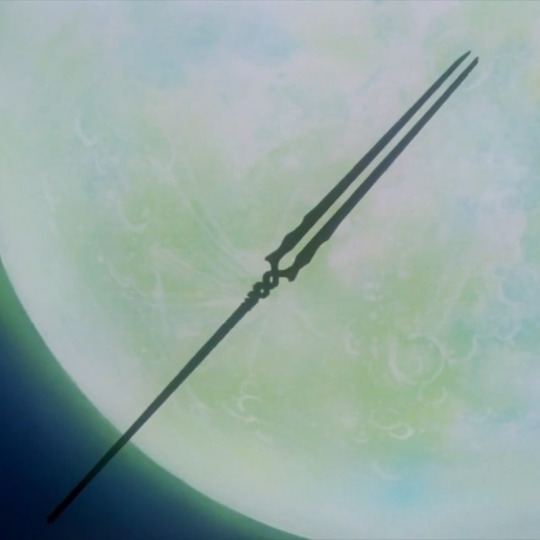
Evangelion's Lance is based on an actual legend in medieval Christian tradition. The legend says that a Roman soldier named Longinus wanted to make sure that Christ was really dead, so he stabbed him in the side with his spear. (The use of the word lance instead of spear is debatable, but I like the alliteration, so I'm going to use it.) All sorts of stories and magical powers are associated with this weapon, and lots of different relics claim to be the "true" Lance. But here's the thing I had forgotten: in order for the Grail to catch the blood of Christ (and thus become the Grail), there has to be a sizable wound. The Lance, then, is what causes that wound.
The Holy Grail is only half of the picture! You can't have the Grail without the Lance; they go together. I felt like a fool when I realized the connection I’d been missing -- the hint was right in front of me the whole time.
In Arthurian tales, the Grail and Lance often go hand-in-hand -- one or both are depicted as continually dripping with blood -- and there have been lots (and lots) of books written about the symbolism behind the two mythical objects. One reading is that the Grail and Lance symbolically represent feminine and masculine aspects, respectively. Or, more irreverently, they represent Venus and Mars. Any of this starting to sound familiar yet?
I've written previously about Star being associated with the goddess Venus. Marco, then, of course, is associated with the god Mars; not only is his name ultimately derived from Mars, but he has a strong connection to the color red and to martial arts. The Roman god of war is depicted as carrying a spear as a weapon -- indeed, it's part of his symbol, which has now become the traditional symbol for "male." If there is indeed a Lance in Star vs. the Forces of Evil, then it seems only fitting that Marco -- the Lancer of the series -- comes to wield it.
Once I started thinking about the Lance, it was easy to find references to it (some more subtle than others). I've divided the theory into two sections: the first part will deal with connecting Pony Head to the Lance (and hence to Marco). The second part will deal with the foreshadowing of Pony Head's death. Let's begin!
Pony Head and Marco
Remember "Party with a Pony" -- the very first episode we see Pony Head in? Do you remember what game Pony Head and Marco play at the Amethyst Arcade?
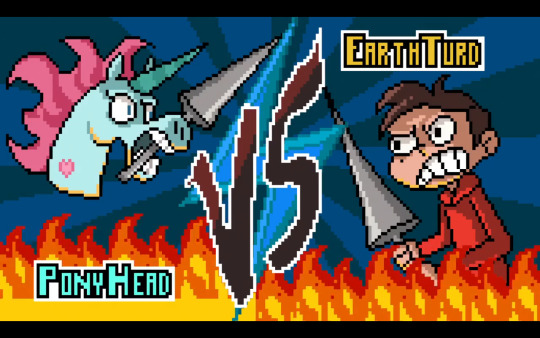
Lance Lance Revolution! I was stunned when I recalled that scene. (I also wonder if it's a stealth reference to the opening of Revolutionary Girl Utena -- watch for the flying horses!) Notably, Pony Head loses the game to Marco. Indeed, for what it's worth, there are a number of references to sharp objects in "Party with a Pony":
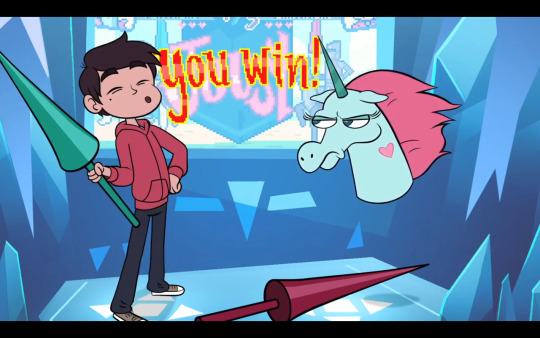
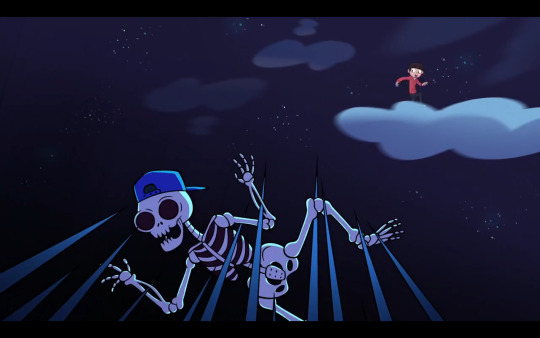
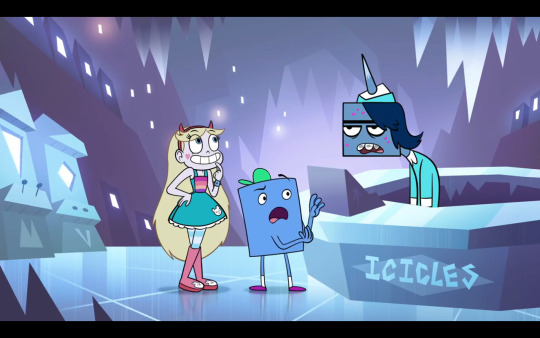
The series is trying to establish a comparison between lances and Pony Head. Sound far-fetched? Perhaps -- but that's the point (so to speak) of this post. This theory's reading opens up the episode to a lot of irony in lines like this, for instance:
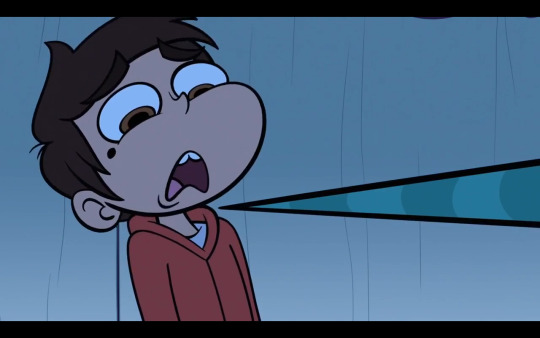
Pony Head: Look here, Earth Turd. This night is really important to me. You mess that up, and you’re gonna get the horn.
Marco could literally receive the horn from Pony Head. And there is another line in "Party with a Pony" that is much, much darker upon re-interpretation, but I'll save that for the second half. For now, let's move on to some other episodes.
Both Star and Marco make use of Pony Head several times throughout the series as a tool:
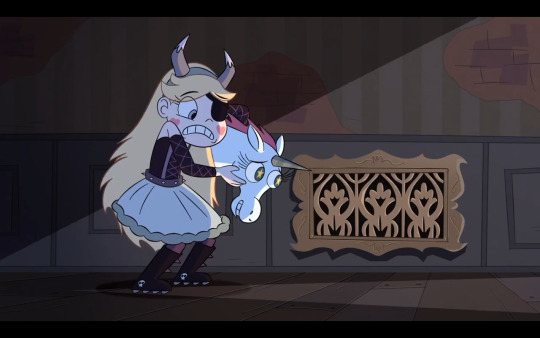
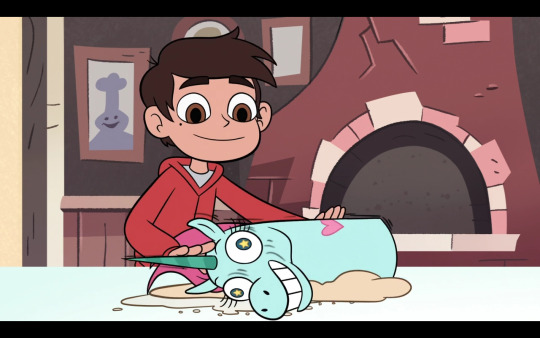
Her role as a tool in "St. Olga's Reform School for Wayward Princesses" and in "Pizza Thing" could foreshadow the eventual use of her horn as a weapon. "Pizza Thing" is particularly interesting as it focuses on Pony Head and Marco's relationship -- indeed, every time we see Pony Head on-screen, she is somehow causing trouble for Marco -- and there are odd lines in it like this one that seem to hint at something else going on:
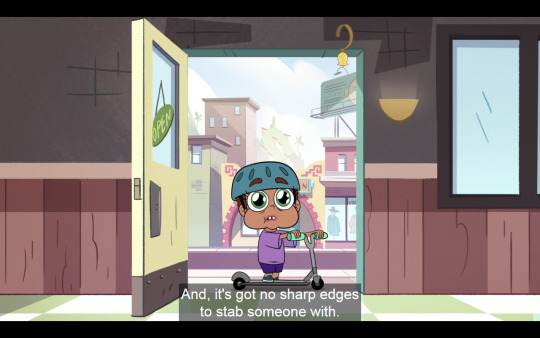
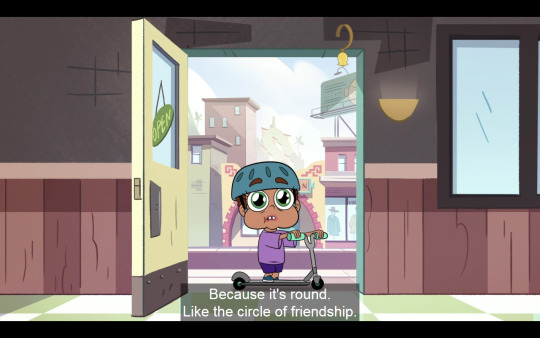
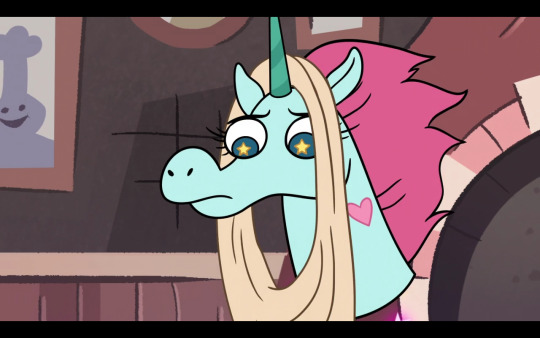
Pony Head, however, does have a sharp edge to stab someone with. Marco using her horn as a weapon would be symbolic of the friendship between him and Pony Head; we would think of her every time he uses it. This shot is probably the most symbolic one in the episode, however:
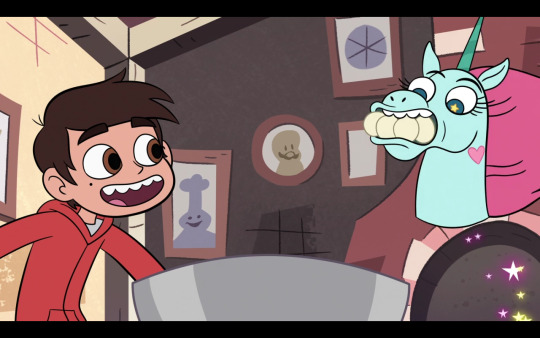
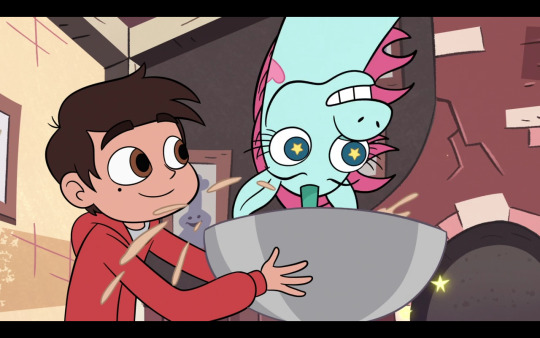
Bowls, as I noted before in my post on the Holy Grail, are symbolic of the Grail; the symbolism, I think, is reinforced by Pony Head putting eggs into it. (Pizza dough does not ordinarily have eggs in it!) Remember: the Grail and the Lance go together. They are a pair, just like Star and Marco.
Finally, there's a pretty unusual passage in Star and Marco's Guide to Mastering Every Dimension:
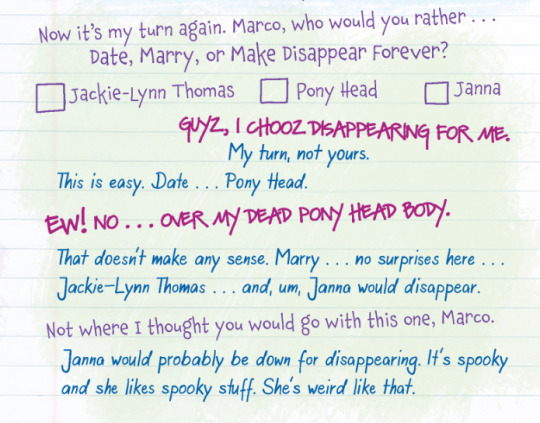
It seems likely to me that the writers intend far more meaning behind Pony Head and Marco's relationship than is apparent at first glance; if this theory is correct, then perhaps Marco and Pony Head will become much closer than they are now just before she is killed, and he will commit himself to keeping her memory alive in a way she would have wanted.
Word Associations
I think "The Bounce Lounge" -- another often-overlooked episode -- is important, too, for establishing darker themes associated with Pony Head: that of old age, finality, and death. Yet, before we get into those themes, there's something odd going on in this episode, something that I've previously remarked on: shot-for-shot, "The Bounce Lounge" and "The Hard Way" have similar composition. (If you play both episodes at the same time, you'll see for yourself what I'm talking about.) In particular, I would like to focus on these two shots:
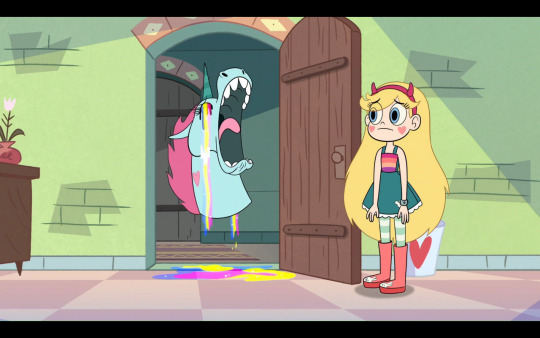
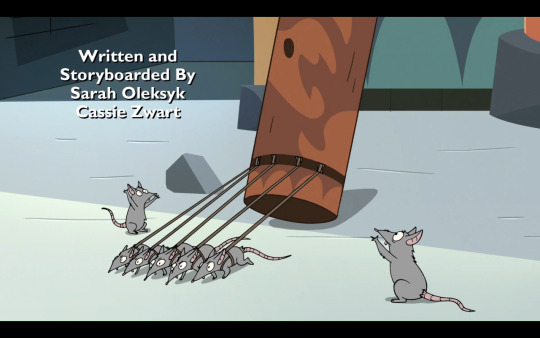
Visually, Pony Head is being compared to a pillar. Pillars play an unusual role in the series; for one thing, they're connected to Indiana Jones and the Last Crusade -- a film about the quest for the Holy Grail. For instance, the pillars that mark the clues that Indiana Jones follows are echoed in the second half of season two of Star vs. the Forces of Evil:
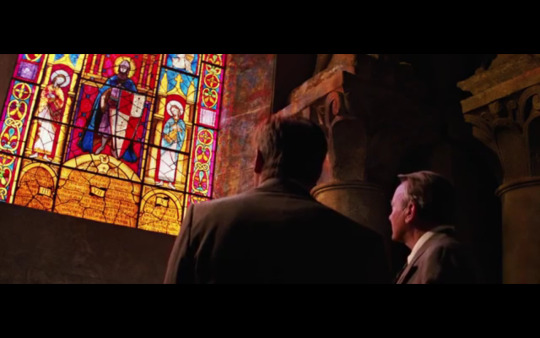
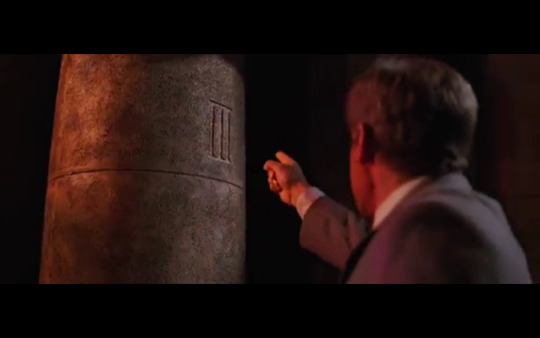
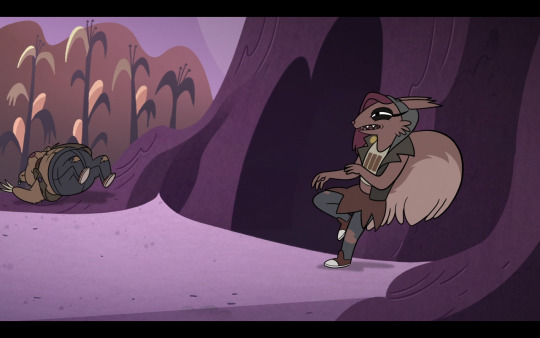
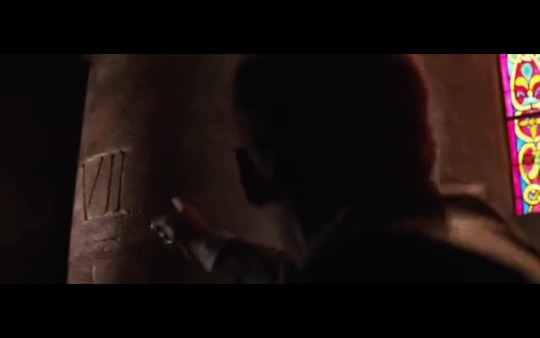
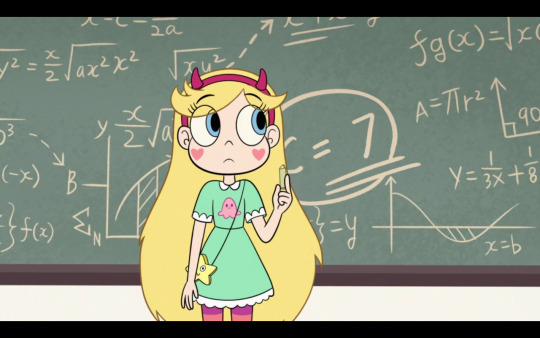
Pillar is a word with an interesting etymology. As you can see, it's ultimately derived from the Latin pila -- a word with some interesting connections (among them: mortar and pestle, pistil) -- but, more to the point (again, so to speak), it’s also etymologically connected to the Latin word pilum -- the famed javelin of the Roman soldier. Both pila and pilum probably have their origin in the proto-Indo-European root *peys- meaning "to crush."
The word pillar is ultimately derived from a root meaning "to crush." If you’re skeptical about the significance of this, just consider what a pillar does at the end of "The Battle for Mewni":
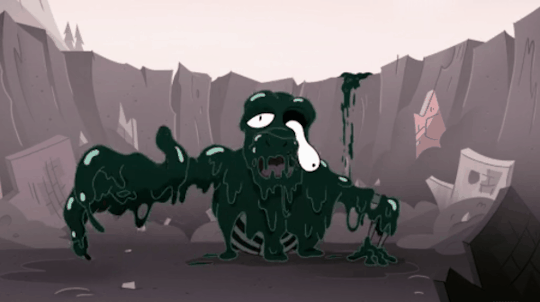
Yeah.
I don't think there's any need for us to balk at this sort of word association -- with cleaved in "Storm the Castle" and Janna sleeping in the grave in "Bon Bon the Birthday Clown," the writers have clearly demonstrated that they're aware of the meanings and etymologies of words. (As an aside, think about how much importance the word crush has in episodes like "Sleepover" and "Starcrushed"!) If Pony Head can be compared to a pillar, then she certainly can be compared to a javelin (or, more aptly, a spear).
The amount of suffering in "The Battle for Mewni" -- and the sheer number of times that the words dead or kill are used -- hint that the series as a whole is moving toward a darker, more serious tone. Would the death of a supporting character really be that out of place? There are some elements scattered throughout the series so far which hint at Pony Head's death; let's take a look at them.
The Shadow of Death
Even from the beginning of Pony Head's introduction, there's an air of danger and death around her; after all, in "Party with a Pony," she does try to kill Marco:
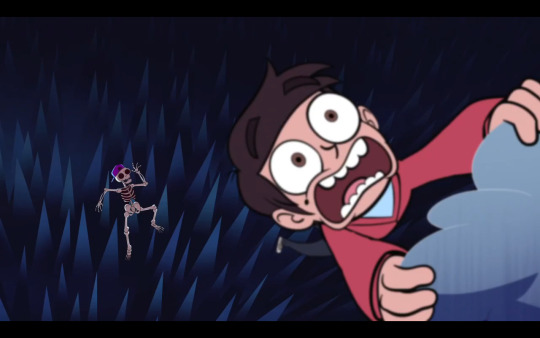
In the same episode, Marco responds to Pony Head with some violence of his own:
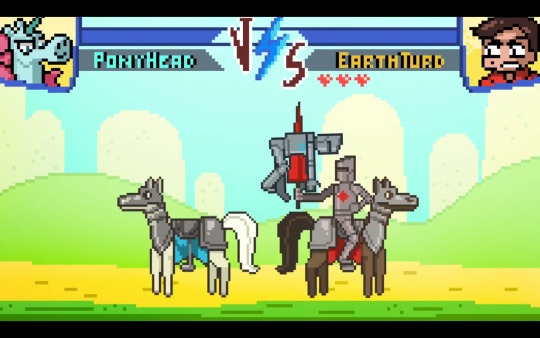
If this theory is right, and Pony Head is destined to die, consider how darkly ironic King Pony Head's incredible line at the end of "Party with a Pony" becomes:
King Pony Head: Ah, kids... You have 'em, and then you... wish they weren't around.
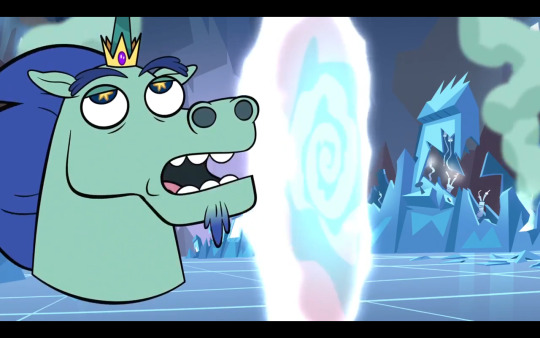
And that episode isn't the only one like that; as I noted earlier, "The Bounce Lounge" is entirely themed around old age, finality, and endings. There's a crow in the decrepit Bounce Lounge, an omen of death (if you watch the scene, note how the sound travels to the left channel, drawing your attention to the crow):
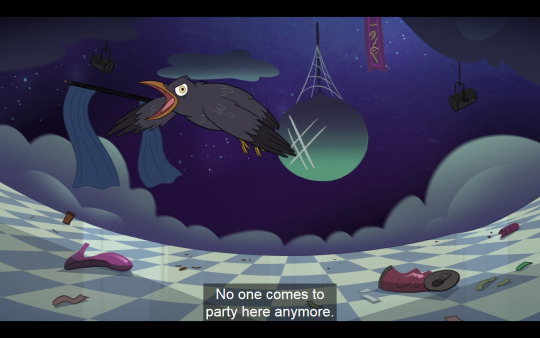
There's some visual metaphor going on as well: when Star starts to cry, all of her glass unicorn figurines shatter into pieces. Could this be foreshadowing Star's sorrow at her best friend's death? Indeed, the entire episode seems dedicated to priming the audience for -- something -- some kind of major loss or death:
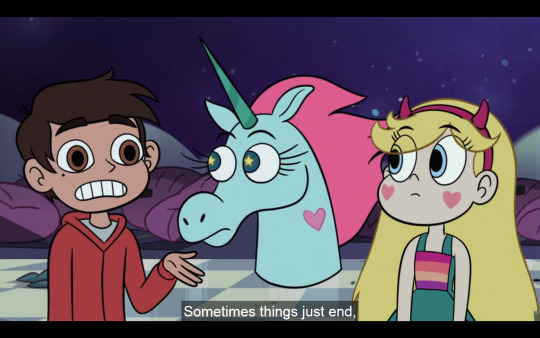
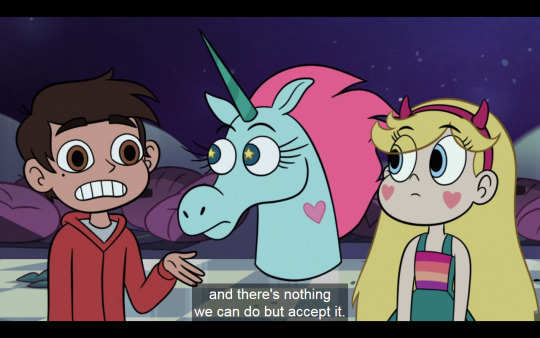
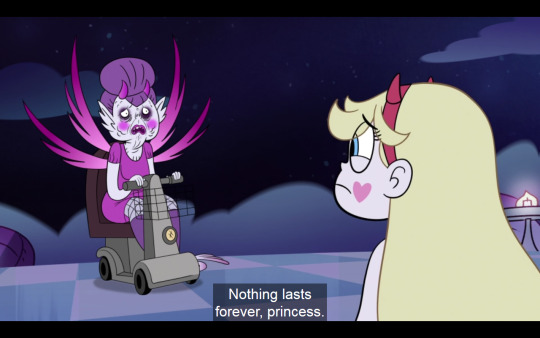
Furthermore, Milly Sparkles says "six customers" -- and the show wants us to pay attention to what she says and how she says it -- but there are actually seven characters present:
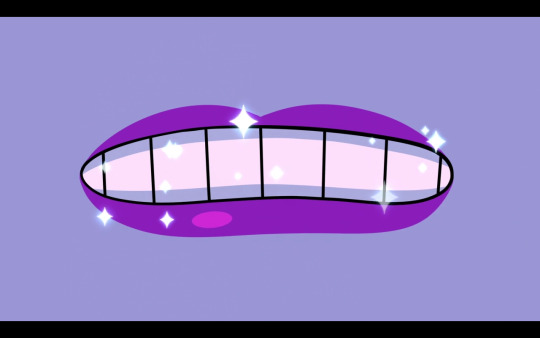
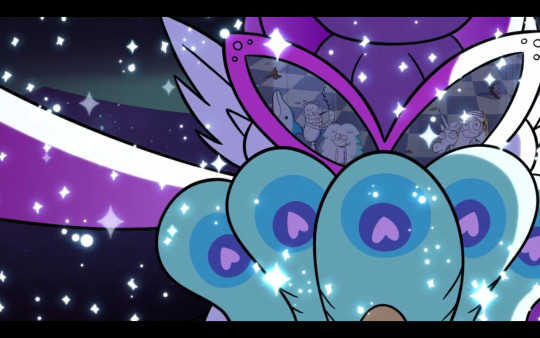
At first, I wondered if something would happen to Marco, since he's the only one not reflected in Milly's shades, but in light of this theory, I now think it's Pony Head. A stretch, admittedly (isn't it all?), but it's hard to deny that "The Bounce Lounge" is a grim portent. To a lesser extent, “Running with Scissors” also presages death in what could be an ironic fashion:
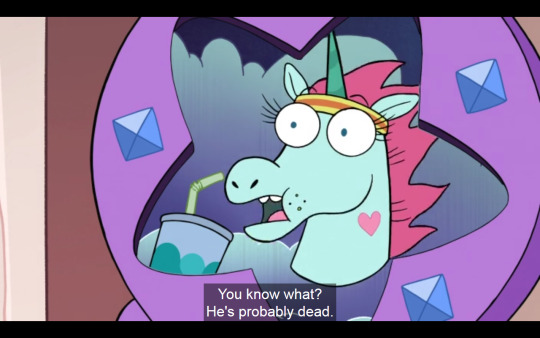
This theory of mine about Pony Head may also help explain something I'd been puzzling over for quite a while during the season two finale livestream, which featured Marco and StarFan13 talking about Easter eggs to watch for during "Face the Music" and "Starcrushed":
StarFan13: Did you find all the Easter eggs? Did you find the unicorn skull, the pizza nuggets, and the shoulder tassels?
As far as I know, there's no unicorn skull in either "Face the Music" or "Starcrushed." However, there are some bones near the flytrap-like plant in "Face the Music":
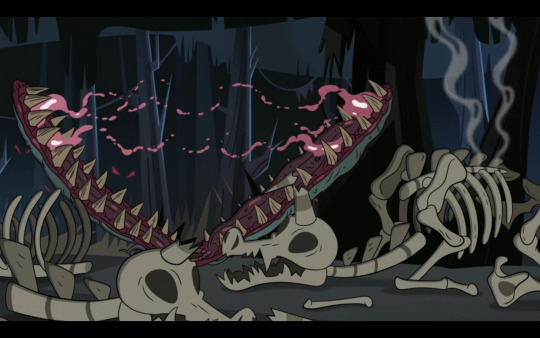
But those don't look like unicorns to me; look at their teeth. (Also, the clues indicate we're looking for a single unicorn skull.) Perhaps this connection is far-fetched, but I always thought the hint of "unicorn skull" prefigured some other death -- and now I think it may be referring to Pony Head's eventual demise. (If someone has an alternate explanation for the unicorn skull hint, I would be happy to hear it!) But this is just a minor point compared to what I think is the biggest clue of all...
In a post about "Starcrushed," I wrote about how, among other things, the Magic High Commission and Star's group of friends all seem to run parallel to one another:
Emergency Friend Meeting: Star, Pony Head, Kelly, Janna, and StarFan13.
Magic High Commission: Moon, Lekmet, Omnitraxus Prime, Hekapoo, and Rhombulus.
Thanks to Moon in "Return to Mewni," we know for a fact that Lekmet is gone for good:
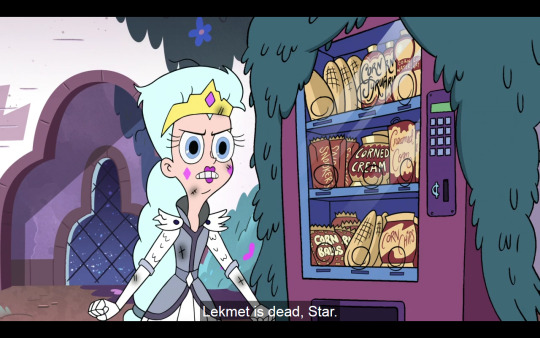
Since "Starcrushed" implicitly compares Star's group of friends to the Magic High Commission, I don't think it's too much of a stretch to posit that one of Star's friends could die as well -- and the closest one to Lekmet in terms of kind and symbolism is Pony Head.
Lekmet is associated with healing (as is the Holy Grail); similarly, real-life legends about unicorns are also associated with healing -- their alleged horns were valuable, sought-after items believed to be cure-alls and were purchased by medieval nobles wanting to protect themselves against poison and disease. Both Lekmet and Pony Head have prominent horns, although Pony Head uses hers for magic, and it hasn't been revealed -- yet, anyway -- whether or not Lekmet's horn is magic (but I think it will be soon).
If Lekmet's horn is to be used as a magic item by Star, then is it really that much of a stretch to imagine Pony Head dying and her horn being used as a weapon by Marco?
How It All Goes Down
From what I've been reading, plenty of fans dislike Pony Head; in any case, I would certainly not characterize her as a popular character. I think she's fine in small doses, and at times she can even be hilariously off-beat: her appearance in "Running with Scissors" attests to that! A moment of redemption for her -- something to truly bolster audience opinion of her, perhaps even a heroic sacrifice -- would fit perfectly, I think, into the development of an otherwise unlikable character. It makes a whole lot of sense to me.
And, if it is to happen, then it seems obvious how: Miss Heinous. From "Heinous" -- an episode that I love due to how utterly off-the-rails demented it is -- it's clear that Miss Heinous is quite involved in the process of losing her grip on reality, and she's also become far more bloody-minded than previously shown. Here's a possible chain of events:
Miss Heinous threatens to kill Marco.
Pony Head sacrifices herself to save Marco.
Marco takes Pony Head's horn for revenge.
Implausible? Sure. I freely admit that this theory is crazy -- it's in the title, after all -- but I absolutely think it could happen, and that's what makes it so deliciously tantalizing. Given the show's running theme of transition, I think it would also be influential in terms of character development for Star if she lost her childhood friend; not only would it be symbolic of her transition to adulthood, but it would provide Pony Head a means of redeeming herself and allow the show to reveal just how dark it can truly be. I can’t wait for November!
I hope you enjoyed reading this! Feel free to complain here (or just send questions). Until next time! Take care of yourselves.
32 notes
·
View notes
Text
FoZ Notes 6
As I don’t expect to be online tomorrow much, if at all, I’ll be posting another Notes update to keep myself on schedule.
------------------
We finally meet Eleanore. Who is an older clone of Louise, but blonde like their father. She insists Louise should have a female attendant, gives no fucks about what the attendants (Saito and Siesta) are up to. [Reader note: Kissing et al]
Due to war conditions and insufficient officers for the army, Henrietta and company close the Academy down and recruit aristocrat kids to fill slots. Osmond and "one teacher" object, but are ignored. [Reader note: I’m pretty sure the ‘one teacher’ is supposed to be Colbert, based on later events. Though really, one teacher?]
Louis is all too honored to join the army... but the Valliere family objects for some reason? Eleanore is dragging Louise home by carriage for some reason.
Albion holds court on a round table of stone. Because Arthurian legend. [Future note: Never crops up again]
Cromwell wants to banish the whole "guy announcing people as they enter" thing because "none of us stands above the other!" (Says the Emperor...) [Future note: This mildly interesting bit of characterization has no relevancy and what it suggests about Reconquistador philosophy is never built on]
Gallia has declared itself neutral in this way... but Albion is trying to talk them into being willing to backstab Germania and Tristain. No wait, they were always Secret Allies of Albion, the defeat at Tarbes just wrecked the original plan to simultaneously invade Tristain. In fact, Gallia is the party that suggested they backstab when Albion is invaded! [Future note: Surprisingly, I don’t think this is a Surprise Plot Tweest the author just made up, as later events are startlingly consistent with this scenario. Could’ve been better set up/presented, though]
Cromwell can raise the dead... and that's all he can do. At least, out of "long incantations". [Future note: Again, he’s not actually a Void mage. He’s just using the Ring of Andvari. Which, by the way, can do other things, so he’s really lame]
Say hello to Zuko. I mean. "White Menvil". Also known as "the White Flame." He's almost parodically evil and killed his own family after dishonorable behavior got his title stripped because lolevil. Albion is hiring him because lolevil.
Cromwell wants Wardes to transport Menvil and a small squad to the Academy of Magic to take nobles as hostages. Never mind that the school is closed?...
... cut to the Academy, where the students are primarily female because the boys all volunteered to be officers. Er. What? Male teachers are gone, except Colbert. Tabitha didn't volunteer. Kirche did, but was refused because gender, though it's unclear whether they mean Germania or Tristain. Kirche views Colbert as a coward.
Ominous Foreshadowing involving a fire stone. [Future note: Wait what? Fire Stones get played up as this insanely big deal we only are now introducing several volumes down the line!]
The Valliere estate is so large there's a goddamn inn to wait at after half a day's travel! What, do they own a third of the country?
Eleanore is engaged. Doesn't like it. Louise is a moron who can't tell when her own sister is enraged, congratulates her. Oh wait she's furious because the engagement got canceled. 'kay. [Reader note: As far as I can gather, it got canceled because Eleanore is a bitch. Yes, Overlady’s presentation of her is more accurate to canon than you might think!]
Finally meet Cattleya. Also an older clone of Louise, only with identical hair color. Her carriage is filled with animals, including a tiger, a snake, a bear, and the more ordinary dogs and cats. Uh. How do they fit and why aren't they violent? In any event, Louise LOVES Cattleya's animals, while Eleanore is reluctantly tolerant.
Eleanore has a pocket watch. [Future note: You guessed it! Never crops up again. Not just hers, but in general we never hear about pocket watches]
Talking owl!! [Future note: Say it with me: this never crops up again]
Giant drawbridge golems!! [Complaint: what are the mechanics and limitations of golems, seriously, this is ridiculous]
Saito is allowed to be at dinner with Louise, but he stands behind her rather than getting a seat.
Sexism, Louise asserts, is "old-fashioned". Uuuuh. What changed, here in Halkeginia??
Eleanore knows about Louise being called "the Zero". Louise is unwilling to let her family know about her Void powers.
The Vallieres are one of the five biggest families of Tristain. [Future note: I still haven’t seen a reference to the other four]
Somethingsomething water magic doesn't work on Cattleya's illness because if you fix a part the degeneration moves elsewhere. "Various" medicines and magics are used to suppress her symptoms, instead. Cattleya can't go to the Academy or marry, as a result. She's supposedly never left the Valliere grounds. [Complaint: Water magic’s ability to fix or not fix things seems to have no even half-coherent system in mind beyond ‘whatever the author wants at this moment’]
The father is "retired". He is opposed to the war with Albion, on the basis that they should "siege" Albion instead, as they don't have a big enough numbers advantage in his opinion. He thinks the Tarbes victory has made Tristain overconfident. He disapproves of recruiting kids, too, claiming they're "useless" in war.
Then he places Louise under house arrest until the war is over. No leaving the castle. Louise ends up claiming her affinity is Fire, gets believed, told "same as your grandfather", a "sinful" element drawn to war. [Future note: This elemental stereotyping thing goes away after, like, the next volume] Ordered to pick a husband -which is interesting, actually. [Reader note: By that I mean I figured that the story would go Full Historical Sexist Mode and have Louise’s father pick out a husband for him, or perhaps demand she accept the overtures of an existing set of people attempting to court her we’ve never heard of before. Instead Louise’s father seems to be operating on the idea that, essentially, she can pick any male noble and be reasonably expected to have the proposal excepted even though she’s a woman and the usual thing is for men to be pursuers]
Cattleya magically knowing things because she's "sharp". [Reader note: Seriously, she just has magical insight/awareness for no real reason. How on Earth Halkeginia did she even develop this level of social insight if she doesn’t interact with people?]
In Tristain, at least, nobles were originally just people who swore they would give their lives for the princess. Riches and land were rewards... and the magicalness isn't addressed. Or at least that's how the Vallieres started, implying Louise's loyalty is a tradition in her family stretching back eons. Fits with the playmate thing.
Cattleya supporting Louise's decision in a sneaky way. [Reader note: She converts the drawbridge’s chains into dirt, so the bridge stays down and Louise and Saito can escape. Mind, this just raises all kinds of questions, as either castles shouldn’t be a thing if they’re so easy for a single noble to trivialize major components of the defenses or the Valliere estate ought to be benefiting from that ‘hardening’ thing we heard about back in volume 1. But noooo, consistency is unacceptable]
Louise uses Henrietta as a guidepost for behavior. [Future note: This... could be set alongside future events to point to as signs of Louise experiencing major character development, but I suspect ‘this never crops up again’ syndrome]
Royal Army, National Army, Sky Navy. Respectively: Mercenaries under the Crown's direct command (through nobles...), farmers levied by landed nobles, and the ships, the last of which... uh... work, somehow.
Guiche's father is Marshal of the Royal Army, because he's retired from military service. (??) Guiche has three brothers.
The students get two months of training.
La Rochelle's sky tree is called Yggdrasil. Shock.
The Air Navy promotes by merit, not birth. [Question: How do they choose who to recruit, though? We never find out]
After Tarbes, Tristain recruited some of the Albionese officers for the Sky Navy. This bothers a lot of the Tristainian airpeople. So much so that there are people plotting for "enemy fire" to kill these guys during combat.
Agnes home of Angleterre/Angle Province is, unsurprisingly, Albion immigrants who integrated into Tristain over time, but always tried to be independent and stuff. Twenty years before canon, roughly, they "forced" the Tristain government to recognize their independence and built a temple to, presumably, Protestantism. This pissed off Romalia, who promptly pressured Triustain into butchering them.
Not-at-all-coincidentally, a month before putting Agnes’ home to the torch, a Romalian New Religion noblewoman washed up nearby. Killing this woman was the reason people were there. The torching was claimed to be about preventing the spread of a disease, though the "New Religion Hunt" it was part of didn't last long due to changes in Romalian leadership.
Some De Poiters guy is blocking the Musketeers from participating in the invasion of Albion because he thinks they'd steal his glory.
Agnes trying to find out who the man who headed the torching/carried her out is so she can kill him. Stonewalled by the page naming him being ripped out of a book about a "magical research group". [Future note: We never get an explanation for this page being missing, I don’t think]
Trolls are as tall as five people. (25 feet?) They live in the northlands of Albion, and are apparently willing to be hired by humans to fight humans, though they're prone to ignoring orders and they hate humans for no clearly given reason. They just like killing humans. And fighting. They're basically Warhammer Orks, really. They have their own language and wield spiked hammers. [Future note: In the not terribly distant future the plot is going to go right back to ignoring the existence of what it calls ‘demi-humans’. Ugh]
Menvil thinks burning flesh is the best smell there is. Finally get confirmation on the obvious point that he was involved in torching Angletierre. Also learning the Magical Research Group actually DID do research -in between being called to suppress dissent and the like. And said research was focused on things like "how much damage does an AOE spell actually do?" and "burning flesh what happen?" Menvil got his Zuko-scar when he tried to attack the leader because he looked up to the guy. Even Menvil isn't sure why he attacked the guy.
Wardes has no soul. Fouquet can feel horror. Gender stereotypes. [Reader note: I forget what this was about, but basically Wardes feels nothing when doing horrific things and Fouquet actually does feel bad. You know, other than about stealing]
Mazarini is ALSO insisting that Tristain could starve out Albion. What, is Albion seriously running at a food deficit it resolves via trade? [Reader note: I didn’t note down the original claim that starving out Albion is a realistic possibility, because it’s dumb. No, the floating island is not a castle. It is, to all appearances, a self-sufficient land that grows its own food. Starving them out makes no sense unless they believe trade embargoes are a possibility, and even that is questionable since Albion apparently flies all over Halkeginia and so could simply trade for food from sympathetic countries when over them. And now that I’m thinking about Dumb Albion Things: why do we never hear about Albion blocking out the sun, or dumping literal rivers of water on the lands below it, or anything of the sort? It’s supposed to be flying overhead!]
Henrietta hates herself blah blah blah. [Reader note: For kicking off a war. Never mind that Albion started it when they tried to kidnap her with a goddamn zombie version of her lover. Nooo, she feels guilty because it’s totally her fault]
Louise is of the belief that sex should only occur after marriage, and only after three months at that, for nobles such as herself.
De Poiters gets entrusted with commanding Louise's Void magic in the invasion.
The story seems to be implying Dragon Knights are all people whose familiar is the dragon they ride?...
Osmond feels a war that takes women and girls lives cannot possibly be just. Agnes' response is "what justice does a war that takes only men's lives have", followed by saying that death is equal. He's got no response for either of these.
Colbert freely admits to being a coward/afraid of war when called such by Kirche.
Demo airships. Uh. This seems like an incredibly bad plan. [Reader note: As in unmanned airships filled with explosives and then launched in the direction of the enemy to explode on impact. This is an actual naval thing, historically, but naval combat isn’t three-dimensional]
Raven familiars as an early-warning system. Sensible. [Future note: Later we find out there’s a low-level wind spell that can be used to get a birds-eye view of nearby locations. So actually not sensible]
Colbert invents magic-seeking missiles -as in, heat-seeking rockets, but chasing magic. Aaaargh. [Future note: The plot makes infinitely more sense if you assume Colbert is a Worm-style Tinker. Or Girl Genius style Spark. He’s ridiculous]
Illluuuusion magic. [Reader note: I... don��t remember what this was in reference to. Something stupid, that’s all I recall]
Ice spear reflecting off the Liar's Mirror to kill the caster. Really?
So if Agnes recruited the girls, why are they at the Academy?... [Reader note: Not sure why I didn’t note it down, but earlier Agnes came along and interrupted Colbert’s class to conscript all the female nobles of the school as soldiers. The implication is that they all leave to go be soldiers at Albion. Then instead the Academy is attacked by Menvil and everybody is at the Academy with no explanation or justification provided. I don’t think this is a failure of the translation, I’m fairly sure this is just one more way in which the author was incapable of being consistent on any level]
Menvil is actually blind, but somehow uses his Fire affinity to have omnidirectional thermal vision. Because shut up. Oh and Colbert is the ex-captain of the Magical Research Group. Because of course all this him-being-a-coward shit is so it can turn out he's a badass who saves the women. Because sexism.
Naturally, fireballs can be used to block other fireballs. Physics. And Colbert uses a transmutation spell to suck all the air out via explosion, instantly suffocating Menvil. Because that's how physics and biology work, right? (Wrong)
A number of "magic arrows" is too serious an injury for magic healing to fix without ingredients. Because drama trumps consistency. Let's have multiple girls faint from trying to fix Colbert! He's too beloved to die! Ugh. [Reader note: We’re supposed to find Colbert a likable, heroic figure, much like Saito. Also much like Saito, he’s nonsensical and not actually likable. Unlike Saito, he’s not a wannabe-rapist... because he used to be a mass-murderer! Classy]
End volume 6.
--------------
Surprisingly little horrible garbage of pointlessness! But a lot of dubious mechanics and inconsistent/probably inconsistent worldbuilding.
[In retrospect: No, there wasn’t much ‘harem shenanigans’, but this was still a horrible volume and all the Colbert-centric stuff isn’t even plausibly fanservice. It’s the author getting off on having his super-awesome regretful mass-murderer do a badass heroic thing and Prove Those Bitches Wrong for thinking he’s a cowardly wuss and have all of them feel sorry and bad for him now that he’s proven them wrong.
And the worst part?
He doesn’t stay dead]
4 notes
·
View notes